#based on episode 3's french translation
Explore tagged Tumblr posts
Photo
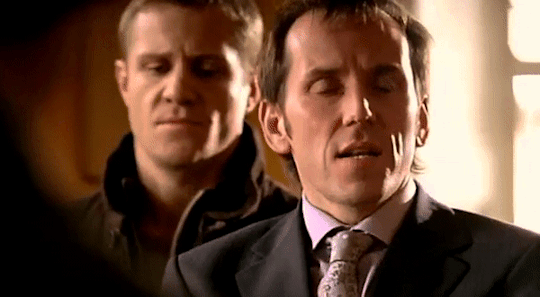
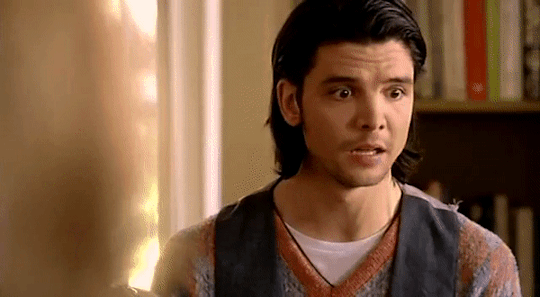
The revelation that Helen Cutter’s still alive changes everything.
She’s still alive ? My God. We have to tell her Prince Charles remarried.
#based on episode 3's french translation#primeval#01x03#Connor Temple#James Lester#primeval gifs#season 1#andrew-lee potts#Ben Miller
25 notes
·
View notes
Text
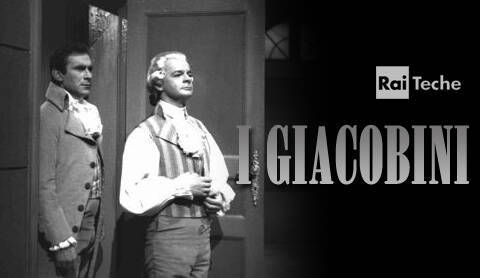
Soo today I decided to look further into whathever happened to the I Giacobini screenplay - buckle in, I did my best to include as much info as I could find!!
"I Giacobini" (the jacobins) is an Italian screenplay from 1962 based on Federico Zardi's homonymous drama and it is, as of today, a lost media.
The cause for the disappearance of the screenplay from the RAI (Italian national public broadcasting company) archives is either reconduced to the lack of care for the preservation of medias at the time or to the theory which believes the cause to be due to political circumstances.
According to Wikipedia (eh):

...while Italy was in the hands of the Democrazia Cristiana, RAI for the first time broadcast to the public a screenplay «practically entirely aligned with the left and in which Robespierre doesn't come off as a bloody monster but rather like a Che Guevara of reason»
The Democrazia Cristiana or DC (Christian Democracy) was a centrist christian democratic political party in Italy.
The screenplay became largely appreciated by the public, as well as receiving praises from Palmiro Togliatti, exponent of the PCI (Italian communist party) - which happens to be one of the DC 's political opponents at the time.

(source)
Palmiro Togliatti on "Rinascita" wrote that television was bringing a change, since «for the first time it brought a representation of the French revolution inside Italian households»
I went ahead and looked through the archives of Rinascita but found this.
Here I found Togliatti's comment on the screenplay - the below image is a section of it:
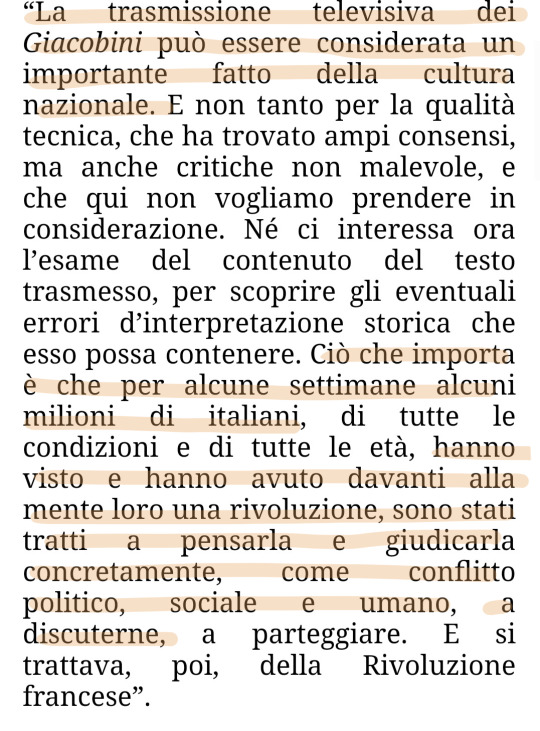
The screenplay I Giacobini can be considered an important event of national culture. [...] What matters is that for some weeks a few billions of Italians, have seen and have had in front of their minds a revolution, have been brought to think about about it and to discuss it, seeing it as a political, social and human conflict.
It's then necessary to understand the political contexts of the time both within and outside of Italy:
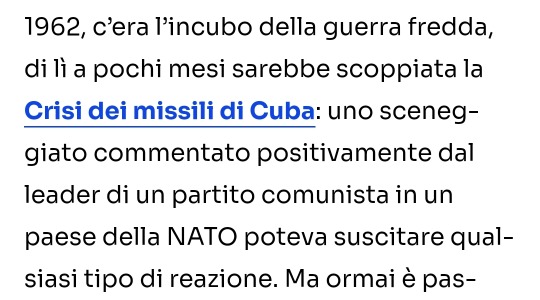
(source)
...In 1962, under the threat of the cold war, a few months before the Cuban Missile Crisis, a screenplay remarked positively by the leader of a communist party in a NATO country could've raised any kind of reaction.
Thus, the mystery surrounding the disappearance of the screenplay is believed to be caused by some archivist involved with the democristian party.
While this is widely believed to be the reasoning behind it there's not much clear evidence and it's likely impossible to investigate since so much time has passed.
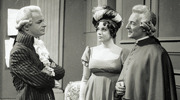
About the screenplay: it was broadcast in 6 episodes, of 90 minutes each, between 11th March - 15th April of 1962 (with a rerun in 1963 after which the tapes disappeared).
It originally featured La Marseillaise, La Carmagnole and Ça ira as well as 4 songs produced for the theater play by Gino Negri.
Audio Recording
In 2012 a man came forward with a (illegally) recorded copy of the audio from the screenplay and sent it over to the Rai archives. The studio managed to recover and digitalize the audios of the six episodes - sadly the video recording is still missing.
Funnily enough, the archive page on which the audios were supposedly made public is gone as of today - but I have found YouTube uploads here: [1] [2] [3] [4] [5] [6]
Also here's a doc that wast broadcast on Italian television on the 11th March of 2012, in honor of the 50 years since the first run of the screenplay - (it's in Italian, if anyone's interested I'll gladly sub it/provide a translation)
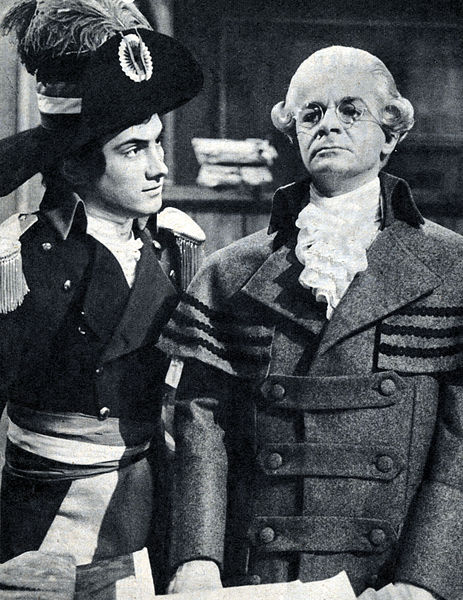
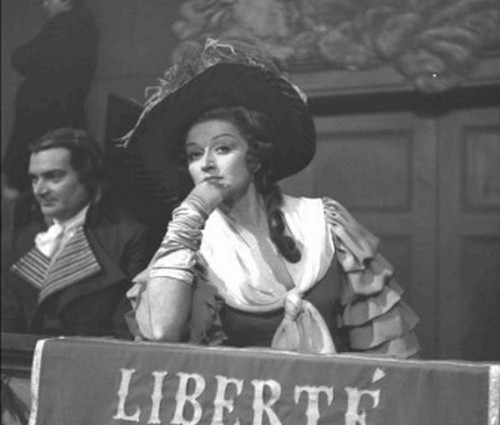
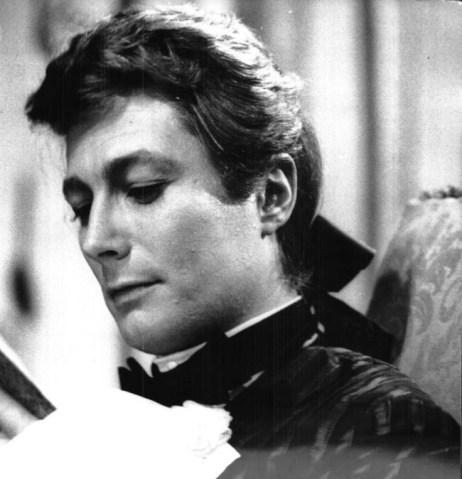
In short - bless that viewer for pirating the audio in 1962 and lots of hate to whoever lost the tapes..
Maybe I Giacobini was the friends we made along the way 🍊
#Hope this is good enough if I find more I'll add to this post :p#french revolution#frev#I giacobini (1962)#I giacobini#Frev lost media
44 notes
·
View notes
Text
Raya Recounts: a brand-new series of overly-detailed opera summaries with unsolicited commentary!
I hope you’ll forgive the irregular time gaps between the episodes, I guess it depends on how much I like the opera I’m covering (or at least, how easy I find it to watch).
Episode 5: Prodaná nevěsta
Prodaná nevěsta (literally, “The Sold Bride”, but usually translated as “The Bartered Bride”) is a 3-act comic opera by Bedřich Smetana. Smetana is known as one of the most internationally famous Czech composers in classical music, if not the most famous after Antonín Dvořák. He is well-known for developing a style of music that contains a genuine Czech characteristic, which of course made him quite associated with Czech nationalism.
Smetana’s most famous piece by far is the symphonic poem Vltava (better known as Moldau) from his symphonic suite Má vlast. You will recognize the melody, especially if you grew up with either Baby Einstein or Little Einsteins. (Also, he composed this piece when he had gone completely deaf, much like what happened to Beethoven. So yeah, double praise.)
The libretto for Prodaná nevěsta was written by Karel Sabina, who also wrote the libretto for Smetana’s previous (and first) work Braniboři v Čechách. This time, it seems to be an entirely original story created by Sabina for the opera itself. This work actually exists in 4 versions; it was revised 3 times, and the final version, which replaced all previously-present spoken dialogue with recitatives, is the one that is usually performed nowadays.
While it has a rocky history, this opera is one of Smetana’s better-known works, and his best-known opera, and it remains often performed worldwide. Because Czech was not a widely spoken language back in the days, international performances at the time were often sung in German instead, under the title Die verkaufte Braut (meaning the same thing as above, obviously), and with all the character names Germanized. This German version is still often performed nowadays, especially in German-speaking countries (no shit!). In general, the opera is often performed in translation, including the Met’s 1978 production which was sung in English.
This opera is also well-known for having 3 orchestral dances based on Czech folk dances, one in each act, which are well-known enough to be performed on their own in concert settings.
This is dedicated to @notyouraveragejulie, for suggesting the title. This is one of my absolute favorite operas ever, so I’m really, really excited to publish this and convince other operablr regulars to join me in the cult of loving this opera.
As usual, solo characters’ named bolded and potentially bad translations for the important numbers. This is my first time tackling a non-Italian opera, and this presents itself as twice as much of a challenge, since whereas I know quite a bit of Italian from learning it in Conservatory and from listening to a lot of operas the way you would pick up Japanese from watching a lot of anime (and also knowing French and Spanish), I do not speak a word of Czech, so just a (major) heads up. At least Wikipedia literally lists all the numbers this time.
Apologies to all Czech speakers.
Spoilers, of course!
We first get a super-energetic overture in F major which, much like the overture for Episode 3′s selection, I would like to classify as being in sonata form, and is well-known enough to be often performed on its own in concert settings (and Mahler very briefly quotes it in the last movement of his Symphony No. 1).
The curtain then opens on Act 1, at a village square somewhere in Bohemia (a region in modern-day Czechia), probably around the time the opera was written (so the 19th century at the very least). There is a fair going on, and the villagers are singing all about enjoying life while it lasts because marriage supposedly leads to strife and unhappiness (Chorus: Proč bychom se netěšili; usually translated to “Let’s rejoice [and/let’s] be merry”, but it seems to more directly translate to “Why wouldn’t we enjoy” or something like that).
As the theme of the chorus takes a minor key, we zoom in on one young couple among the villagers; the guy, Jeník, a tenor, asks Mařenka, his soprano girlfriend, why she looks so gloomy. She explains that her mother told her that the guy she is betrothed to is coming to the village to visit her. Jeník tells her not to worry, to trust him (Jeník) and to keep her will strong. The chorus of villagers tells her to stop lamenting because her faithful love for Jeník will definitely end up earning a blessing, then sings a reprise of the opening chorus before going off to party a little more.
Once they are left alone, Mařenka remains pessimistic, and Jeník asks what happened exactly. Mařenka tells him that the farmer (as in, landowner) Mícha and his son are coming to the village to ask for her hand in marriage. Jeník asks what her answer will be, but Mařenka despairs because it would be difficult for her to say that she is already in love with another, since this is a promise that her father is bound to fulfill.
She then remarks on his reserved attitude, and tells him to assure her that he doesn’t have another lover somewhere or something like that, and he affirms that he absolutely doesn’t. Mařenka tells him that should she ever find out something like that about him, she would get really angry (Aria: Kdybych se co takového; “If I ever learn”). She asks him why he left his home and his entire former life behind, and remarks on how his whole past is shrouded in mystery, which her father has mentioned to her several times.
Jeník tells her about his Tragic Past™: he is the son of a pretty well-to-do father, but after his mother died, his father married a woman who ended up kicking him (Jeník) out. So he basically set out into the world and supported himself by entering the service of other people. He and Mařenka go on about how a stepmother’s hate can really be hurtful, but that committed love like theirs cannot be hurt by pains from the past, and they promise to love each other forever, and they are usually just being the most cutie-patootie thing ever, depending on the production (Duet: Jako matka požehnáním... Věrné milování; “As a mother’s blessing... Faithful love”).
After that, Mařenka hears her parents coming, looking for her. Jeník, not wanting them to see him, bids her a heartfelt goodbye, before they each exit the stage separately. Now enter Krušina, a baritone peasant, and Ludmila, a soprano, both Mařenka’s parents, along with Kecal, a bass and a marriage broker who is very much a businessman in terms of attitude. Kecal is in the midst of discussing the whole arranged marriage business; he assures Krušina that it’s all gonna go smoothly thanks to his sharp skills, and that should Mařenka object and stuff, he will make sure that she does what she is told (Trio: Jak vám pravím, pane kmotře; usually translated to “As I’m saying, dear fellow”, but it contains the word “kmotr”, meaning “godfather”).
While Krušina expresses satisfaction with this arrangement, Ludmila says it’d be better to take the time to discuss this with the bride-to-be. But Kecal remains very confident that their firmness and his wit alone will win over any objections the bride-to-be has over this marriage. Ludmila says that it depends on what the bridegroom himself is like, but Kecal continues to dismiss this.
We then learn through Krušina that Tobiáš Mícha is a childhood friend of his, and that he has two sons: one Jeník by his first wife (wait, that same Jeník we met minutes ago??? We’ll just have to wait and see...), and one Vašek by his second wife, but he (Krušina) doesn’t know either son. Despite that, he promised years ago that he would give his daughter’s hand in marriage to Mícha’s son. Ludmila asks which son Kecal is talking about, he replies that Mícha technically only has one son: Vašek. He dismisses the other one as a vagrant and a rascal, and says that no one knows about him (rude).
Krušina inquires about what kind of boy Vašek is like, and asks why Kecal didn’t bring him with him right now. Kecal starts rattling off all of Vašek’s virtues (Trio: Mladík slušný; “A decent young man”): he is a young man quiet as a lamb, he supposedly has no faults or flaws, he has a lovable soul, he is neither too much this nor too much that either physically or mentally, is in good health, and especially, he is set to inherit a farm worth thirty thousand (the currency is not stated here, but later in the libretto, it’s shown to be guilders). What can anyone want more from a perfect bridegroom like him??? Krušina and Ludmila believe his words to be true, and all three repeat their lines for a few more measures.
Then Mařenka comes back in, and asks her parents why they were looking for her (Quartet: Tu ji máme; “Here we have her” or something like that). Kecal says that he was asking her parents if she has someone she is in love with, and tells her that if she doesn’t, he has a young man to introduce her to. Krušina and Ludmila assure her that she will meet him first, and if she doesn’t like him, she can turn him down. Kecal announces that a deal has been reached, and that everything will be settled once Mařenka says yes. Mařenka objects that this can’t be settled as quickly as he says, and that he doesn’t even suspect that there is a hitch in this whole thing. But Kecal doesn’t care, claiming that he never quits whatever he puts his mind to.
Mařenka finally admits that she is already in love with another. Kecal tells her to dump him and let him seek his fortune elsewhere. Mařenka retorts that she has already given him her word, that she has already signed a contract for this. Kecal replies that he gives zero fucks, that they can tear up the contract, and then it’s just a whole back-and-forth argument between them. Kecal says to trust the absolute wonders of his wit, and everything will work out no matter what, because his mind is apparently just so amazing that it can succeed where no one else can (damn, that bloated ego gives me a lot of miscellaneous déjà-vu).
Mařenka claims she knows that Jeník won’t give her up, and is ready to stake her life on this (Recitative: Jeník neupustí; “Jeník won’t let go”). Krušina says that whether or not Jeník would give her up doesn’t really matter, because he has made a promise to Tobiáš Mícha in front of witnesses. At Ludmila’s inquiry, Kecal pulls out a contract, which he shows to have been signed by Mícha, Krušina and witnesses. Mařenka says it doesn’t matter, since she and Jeník didn’t know anything about that contract and that they still won’t give each other up, then she leaves.
Kecal gets briefly frustrated at how twisted the world is (uhm, because a girl actually knows her rights as an individual person??), and Krušina asks him where Mícha and his son the Perfect Bridegroom™ actually are right now, as it would be nice for him to actually talk to Mařenka. Kecal agrees, but explains that the boy is not used to talking to women, he is incredibly shy. Krušina briefly remarks on how hard this will make the wooing process. Kecal suggests that Krušina try to meet Mícha elsewhere “by chance”, as the square is about to get noisy now that the villagers are getting ready to dance (man, the people in this village love to dance and party!). This is indicated by the beginning of a polka (a type of Bohemian (as in, from the region of Bohemia) folk dance with a 2/4 time signature) in the orchestra. Meanwhile, he (Kecal) resolves to find Jeník and try to talk to him. Both leave.
The villagers come back onstage as the polka starts picking up. This is the first orchestral dance interlude; many productions will bring in actual dancers to show off what they’ve got, and also sometimes to excuse choristers who can’t dance very well... Anyway, the chorus sings all about the bounciness of the polka, and the curtain falls as everyone present is having a great time (Finale: Polka... Pojď sem, holka, toč se, holka; “Come here, girl, spin, girl”. You might recognize it if you’re familiar with Baby Einstein. The orchestral version linked is without chorus, tho).
Act 2 opens inside an inn in the village. Jeník and a male chorus of peasants are seated at a table drinking beer. The chorus sings the obligatory opera drinking song all about the wonders of beer, all the typical stuff about how it’s a gift from heaven, it reduces troubles to nothing and it gives strength and courage (Chorus: To pivečko; “That [little] beer”).
Jeník, ever the tenor, claims that love is better than either wine or beer, as it’s the only lasting source of happiness. The chorus tenors acknowledge that he’s currently head over heels in love, and the basses point out Kecal, who is sitting somewhere in the background, and they warn him (Jeník) not to let that old dude spoil his happiness in love. Kecal finally speaks up, claiming that good advice and money are the only two important things in life, and that whoever uses them sensibly will be well-anchored. As the other men sing a reprise of the beer chorus, Kecal and Jeník continue arguing the merits of either money or love over beer and honestly everything else respectively.
Then the orchestra starts playing a furiant (another Bohemian folk dance, of a particular fast and fiery character, with the time signature either alternating between 2/4 and 3/4 or, as in this case, in 3/4 with lots of accents) (Dance: Furiant. It’s less well-known than the other orchestral dances in this opera, but do listen to it here). A lot of productions will showcase male dancers jumping and spinning energetically, and I’m so here for it. After that, everyone probably either shrinks to the background or leaves altogether, for the sake of the next scenes.
A new arrival shows up slowly onstage; it’s none other than Vašek himself! A stuttery, big baby tenor, he is indeed as shy as we have been told he was, if not so much more. In a stuttering song well emphasized by accents in the orchestra, he muses about how his mother told him that he should be getting married, and he adds that if he doesn’t, he will become the laughingstock of the village (Aria: Ma-ma-ma-matička; “Mo-mo-mo-mother”). (Yes, I know making fun of stuttering hasn’t aged well. But.)
Then, Mařenka shows up (interesting note: in the score, it says that they bump into each other and burst into laughter, but I don’t think I ever saw this in a production). She recognizes Vašek but pretends to be someone else (Recitative: Vy jste zajisté ženich Krušinovy Mařenky?; “Surely you are the groom of Mařenka Krušinova?”). When he asks how she knew who he is, she points out his outfit, which should logically be ridiculously tacky clothes typical of a sheltered rich kid about to get married. She also adds that the entire village is talking about him and pitying him.
He asks why, and she says that “Mařenka” already has someone else in her life, and that she is planning on deceiving him (Vašek) and making his life hell in order to make him die soon. The simple-minded Vašek is confused at first and then terrified, as his mother told him that he has to get married. Mařenka points out that he can still get married, since there are plenty of girls around here for him to choose from.
When he expresses enthusiastic interest, she tells him about a girl she knows who supposedly has been madly love for him for a long time now (Duet: Známť já jednu dívčinu; ���I know a girl”). Reassuring all his worries about “Mařenka” and his mother, she describes that girl as pretty and young just like “Mařenka”, and also adds that should he refuse her (that girl), she would get so upset that she would probably try to kill herself. She adds in some (probably fake) crying, and the ensuing conversation between her and Vašek leads to her easily tricking him into falling for her charms, seemingly framing the whole thing as that girl being none other than herself (not smart, Mařenka, not smart).
She continues wooing him, telling him she would love him like a baby in diapers or something (I mean, he IS a big baby after all), and makes him swear to never marry “Mařenka”. While Vašek refuses at first, she manages to make him tearfully agree by threatening bad things happening to whoever courts “Mařenka”, and she makes him swear to never want anything to do with her, to never want to see her or hear of her. And after a recapitulation of the initial theme of the duet (the bit with Mařenka telling Vašek about a girl who is in love with him), they both leave.
Then, Jeník and Kecal return to the foreground, the latter in the midst of trying to negotiate a deal with Jeník, to get him to give up Mařenka in exchange for a rich wife, with very little regard for literally anything else (Recitative: Jak pravím, hezká je; “As I’m saying, she is pretty”). Of course, Jeník remains absolutely firm on his refusing to give up Mařenka, but Kecal chides his sentimentality, telling him that money is more important. They have a whole back-and-forth about this whole business, with Kecal especially stressing that marrying a girl only brings benefits if she has money, because apparently wives always cheat on their husbands at some point, and them having money at least leaves them with something (se-xist, se-xist) (Duet: Nuže, milý chasníku; “Now, my dear gentleman” or something like that). (We also learn that Jeník comes from far away, someplace at the Moravian borders, but that detail is not important for now.) Kecal continues to try and persuade Jeník to give up Mařenka, in exchange for a rich girl who owns/is set to inherit a cottage, some animals, a piece of field and a new cupboard (because yes, Kecal, as @notyouraveragejulie so kindly pointed out long ago, a new cupboard will totally seal the deal), and most importantly, MONEY!
And if Jeník accepts to give up Mařenka, he will receive a hundred guilders (Recitative: Odřeknešli se Mařenky; “If you give up Mařenka”). Jeník refuses, claiming that it’s too little money for such love. Kecal increases the amount to two hundred, but Jeník still claims it to be too little. When Kecal increases the amount to three hundred, he says that should Jeník continue to refuse, he will use all his ressources to drive him out of here. Jeník initially refuses when he hears that Kecal will be the one giving him the money, since he wouldn’t sell Mařenka to him for anything, but Kecal clarifies that he’s not the one who wants her, since he already has a wife (wait, what?!! How did I not know that??? Anyway, I pity her, whoever that woman is), and he’s actually negotiating on behalf of the son of Tobiáš Mícha.
This time, Jeník (HMMMMMMMM????? Has Jeník realized something????????) seems to accept the deal, but adds in a condition that no one but the son of Tobiáš Mícha can get Mařenka, and insists on making it an actual clause in the contract. Kecal accepts the deal, and starts going to call in witnesses, but Jeník also asks to add in a condition that as soon as Mařenka and Mícha’s son have consented to the marriage, Krušina’s debt to Mícha shall be entirely cancelled. Kecal agrees, and leaves.
Jeník is left alone, and to make sure that the audience fully understands what is happening in case the production and/or the singer didn’t make the earlier realization very clear the moment the name “Tobiáš Mícha” was uttered, he gloats over his successful manipulation of Kecal’s deal. Then he sings sentimentally about how could anyone ever believe that he would actually sell his darling Mařenka, his angel, for literally any amount of money; there is no one else in the world like her and he would do anything for her, he just loves her so much (Aria: Až uzříš... Jak možná věřit; “When you see... How could you believe”).
Then, as the orchestra plays the first theme of the overture, Kecal comes back in, calling a chorus of villagers, including Krušina, to come in and witness the signing of the contract (Finale: Pojďte, lidičky; “Come, people”). Jeník publicly reads out the terms of the contract, in which he officially agrees to give up his girlfriend to no one but the son of Tobiáš Mícha, IF he (the son) truly loves her and agrees, in front of witnesses, by his own free will, to marry her. The chorus and Krušina are in awe at Jeník’s willingness to make such a selfless sacrifice.
BUT THEN, Kecal clarifies that Jeník is receiving three hundred guilders from this deal, meaning that he basically sold Mařenka in exchange for this money. This time, the mood completely changes, with the villagers and Krušina calling Jeník a scoundrel for doing something as shameful as selling his girlfriend like this. When Kecal tells Jeník and then the witnesses to sign the contract, Jeník signs it as “Jeník Horák” (often translated as “Jeník of the mountain[s]”). As Krušina signs, he (Krušina) declares being glad to have finally known his true nature, and the curtain falls as the chorus continues to shame Jeník for selling his sweetheart. (In the 2019 Garsington production, which happens to be the first one I ever watched (I needed subs) and which updates the setting to the 1950s, someone even splashes Jeník in the face with beer!! Just mentioning it because I love this detail.)
Act 3 takes us back to the village square as in Act 1. Vašek is all alone onstage, pondering out loud in an equally stuttering second aria, absolutely terrified of the possibility of “Mařenka“ poisoning him and stripping him of everything (Aria: To-to mi v hlavě le-leží; “It-it’s in my head” or something like that).
But his musings are interrupted by the approaching sounds of a trumpet, a piccolo and some percussions playing a march. Other villagers probably also come to see what’s going on. It’s a traveling troupe of performers! (The original Czech refers to the performers as “comedians”, but it does have many characteristics of a traveling circus.)
The leader of the troupe (the original Czech refers to him as the “principal comedian” and Wikipedia calls him the “Ringmaster”, but I’ll just call him “the leader”), a character tenor who doesn’t need a lot of singing skills because his part, at least in this recitative, mostly consists of repeated notes, announces that they will be putting on a supposedly never-seen-before show later today, consisting of one Esmeralda Salamanca performing various acrobatic feats, a Native American from the faraway Tahiti islands swallowing forks and knives (yes, this did NOT age well), and most importantly, a real tamed American bear who will be dancing a French Cancan with Esmeralda (Recitative: Ohlašujeme slavnému publikum; “We announce to the [famous] audience” or something).
The leader gives everyone who is watching a quick preview of the upcoming show, during which the performers, who in many productions are played by actual circus performers, get a chance to show off their skills (or lack thereof, probably for the sake of foreshadowing some later revelations about the shadiness of the troupe, as in the 1982 Vienna production) as the orchestra plays a skočná (yet another Slavic folk dance, this one being of a particularly rapid characteristic and usually with a 2/4 time signature. I noticed the name “skočná” resembles the Czech “skočit”, which means “jump”, but I’m not sure if they are connected) (Dance: Skočná, often better-known as the “Dance of the Comedians”. Listen to it here, conducted by the famous Herbert von Karajan. It’s mostly well-known for being used extensively in the Road Runner cartoons).
After the dance is finished, Vašek expresses excitement about the upcoming show (and also ogles Esmeralda’s legs) (Recitative: Je-je-je-je! To bude hezké!; “Oh-oh-oh-oh! It’s going to be lovely” or something like that). Esmeralda, a soprano, approaches him and asks if he will be attending the show. He answers that he will, and that he is looking forward to seeing her tightrope walking.
But then the “Native American”, a bass (who by the way speaks fully fluent Czech with zero written-in accent, making me strongly believe that he’s an in-universe redface character or something like that), comes in running, telling the leader that the guy who was supposed to do the dancing bear number got so drunk that he can hardly stand on his feet. The desperate leader considers using some boy from the village as a replacement, but the Native American points out that word might get out and the troupe will be laughed at, and besides, they have to find someone who can fit properly inside the bear suit, and there is barely any time left before the show anyway. Meanwhile, Vašek is becoming more attracted to Esmeralda. The men notice that the bear suit might fit Vašek quite well. The leader sends the Native American and the other performers (except Esmeralda) away while he talks to Vašek, and the rest of the troupe exists as a reprise of the march plays.
Now that the three are left alone, the leader and Esmeralda use Vašek’s very obvious infatuation to persuade him to join the troupe, with Esmeralda’s love as a reward. The leader in particular tells him all about the life of a performer, including plenty of debts money, freedom and a highly regarded status. Of course, they do the thing of not pressuring him, telling him to only try it once today, and Esmeralda demonstrates the Cancan part that he is supposed to perform. At first, Vašek fears what his mother will think, but the leader and Esmeralda assure him that she won’t recognize him because he will be fully dressed in an animal suit (Duettino (Italian diminutive for duet, i.e., “little duet”): Milostné zvířátko uděláme z vás; “We will make a lovely little animal out of you”). Then the two leave.
Vašek is left alone for a short while, trying to process all that has been going on, between the marriage and the performers’ troupe (Recitative: Oh, já ne-nešťastný!; “Oh, unhappy me!”). In come Vašek’s father, Mícha himself, a bass, and mother, Háta, a mezzo, accompanied by Kecal. Háta asks Vašek why he looks so sad. He says he is afraid. She asks why, and tells him to get married because apparently everything will be alright once he gets a wife. Kecal and Mícha try to get him to sign the contract to marry Mařenka, but Vašek says he doesn’t want to, to the great confusion of the other three (Quartet: Aj! Jakže, jakže?; “Ay! How, how?”). Vašek claims that Mařenka would poison him, and the others ask him where he got that silly idea. He says that some pretty girl who likes him told him that today. When they ask him if he knows her, he admits that he doesn’t, before leaving. Kecal, Háta and Mícha suspect that there’s something fishy in there, and Kecal decides to get to the bottom of this whole thing.
At this moment, Mařenka comes in with Krušina and Ludmila. Mařenka has been told about how Jeník basically sold her, and she is in complete, desperate denial about this whole thing (Ensemble: Ne! Ne, tomu nevěřím; “No! No, I don’t believe it”, with a few more no’s that I was too lazy to add). Kecal proves it by showing her the contract that Jeník signed to give her up in exchange for three hundred guilders. Mařenka is completely upset at this supposed betrayal, especially since Jeník swore that he would basically sacrifice the world for her. Krušina tries to reassure her that at least she know knows his true character. Kecal tries to get her to sign the contract to marry Vašek, but she refuses, claiming to prefer living alone forever without breaking her promise. Kecal and the two pairs of parents tell her that there is no way around that.
Kecal calls Vašek over, and he (Vašek) immediately recognizes Mařenka as the girl who told him all these scary things, and who also told him that she would love him (uh oh, uh oh. Mařenka, this is why I told you your scheme was not very smart!!!!). All the adults introduce her as his future wife. Vašek (who seriously has, as the French say, un cœur d’artichaut (“an artichoke heart”), meaning he falls in love wayyyyyy too easily) still claims to like her. Kecal tries to get them to sign the contract, but a weepy Mařenka claims to need a moment to think it over. Kecal and the two pairs of parents urge Mařenka to think very carefully about the choice she is about to make, and not to let her stubbornness get in the way because her happiness literally depends on this choice (Sextet: Rozmysli si, Mařenko; “Think about it, Mařenka”). Mařenka says she will think about it, and everyone but her leaves.
All alone, Mařenka expresses her extreme sorrow at Jeník’s betrayal and her crushed dream of love in one of ye long typical soprano aria of despair, even though it seems at some point that she still doesn’t entirely believe the whole betrayal thing, considering that maybe Jeník himself doesn’t even know about it (Aria: Oh, jaký žal!... Ten lásky sen; “Oh, what grief!... That dream of love”. Ngl, this moment really made me think of the stages of grief. We already have denial, bargaining and depression in there).
Jeník comes in running, calling Mařenka the star of his life and asking her how is their cause currently standing. Mařenka angrily rebuffs him (ah, there’s the anger!), asking how he could stoop so low as to literally sell her heart, and she asks whether he did actually do it, telling him to only answer either yes or no, nothing else. Jeník begs her to let him explain, but Mařenka refuses to hear his excuses and asks if he did sign that contract to sell her.
When he confirms it, she warns him to never come near her ever again, and declares that she will marry Vašek. Jeník bursts out laughing upon hearing this, which further angers Mařenka. Jeník again begs her to just let him explain his side of the situation, but she still refuses to listen. Jeník remarks on her stubbornness and asks if he could really look into her face if he really were guilty, to no avail. Ye typical operatic back-and-forth ensues (Duet: Mařenko má!... Tak tvrdošíjná; “Mařenka mine!... Are you so stubborn”. It’s actually my favorite musical bit in this entire opera. Listen to it here, sung by Peter Dvorský and Gabriela Beňačková; I used this specific recording in my 5th Opera(s) as Vines video. Mařenka sings two high C’s).
Kecal returns and tells Jeník that he will soon be getting his money, much to Mařenka’s disgust, and he asks Mařenka if she will marry Mícha’s son. Jeník replies that she will and that he swears that no one else is to have her. Kecal praises his sensibility and Mařenka calls him (Jeník) a scoundrel and a liar, and absolutely refuses to marry. Jeník asks Kecal what he would give him if he managed to persuade her, to Mařenka’s absolute anger and despair. Jeník gently tells her to trust him because Mícha’s son loves her so fucking much and there’s luck and happiness in store for her within this marriage, Mařenka continues despairing, and Kecal praises the wisdom of Jeník’s words and is seemingly just amused by the whole thing, and then they all agree that it is now time to bring in the parents and witnesses to put an end to this whole fuckery (Trio: Utiš se, dívko; “Calm down, my dear”).
Kecal leaves, and Jeník and Mařenka are very briefly left alone; he asks her if she still doesn’t understand what is really going on. She rebuffs him again and he steps aside. Then Krušina, Ludmila, Mícha, Háta and the chorus of villagers all come in. The chorus urges Mařenka to tell them her final decision (Ensemble: Jak jsi se, Mařenko, rozmyslila?; “How have you changed your mind, Mařenka?” or something like that). Aside, Mařenka looks forward to trick Jeník and get revenge on him by doing what he probably is not expecting. Then, she announces that she will do as she is asked (i.e., marry Mícha’s son). The chorus praises her decision and proclaims that the fuckery is now ended, and the wedding shall now take place.
Jeník steps forward, proclaiming that yes, the wedding shall now take place and that everyone will rejoice. The surprised Mícha and Háta immediately recognize him and ask where did he come from. Jeník addresses Mícha as “father” and muses that he has lived in a foreign place for a long time and that he suspects it is high time for him to come back home. Kecal is absolutely speechless upon hearing that this simple, poor boy is in fact Mícha’s eldest son, as he thought he was a soldier (I have no idea where that point came from). Jeník confirms again that he is indeed Mícha’s son, and clarifies that while he is no soldier, he did have to fight many personal battles with fate during his wandering days.
Háta retorts that he certainly had plenty of time for all the wandering around he did, and Jeník replies that he is all too aware that she had kicked him out, as he previously mentioned in Act 1. But he brushes it aside as no big deal, preferring to focus on his claim for Mařenka’s hand in marriage, which he says he is entitled to as a son of Mícha. He makes it clear that he actually tweaked the deal in his favor, and that there are technically two eligible sons for Mařenka to choose from. Mařenka finally understands where he is coming from, proclaims herself as belonging to him and joyfully throws herself in his arms.
Kecal completely despairs at his defeat by Jeník’s cunning trick, which apparently destroyed his reputation and honor. Everyone starts laughing at him, going on about how that wisdom of his which he has boasted so much about throughout the opera seems to have left him, and that what happened to him was pretty stupid (yes, Kecal, serves you right for being a pompous asshole who only cares about money) (note: it’s never indicated exactly, but because he is never mentioned after this scene either in the libretto or the score, one could assume that he leaves).
But these jolly happenings are interrupted by shouting noises backstage, followed by two boys running onstage, screaming in lines spoken rather than sung, about how the performing troupe’s bear has escaped and is running in this direction. Said bear comes onstage, and reveals itself to be Vašek in costume, telling everyone not to worry, as it’s only him. Everyone laughs. Háta scolds Vašek, calling him a fool, and then drags him offstage. Krušina tells Mícha that hopefully he will recognize that Vašek is still a bit young of mind, not ready for marriage yet. He and Ludmila encourage Mícha to make peace with his son Jeník, with whom he is finally reunited after such a long time.
Mícha blesses the couple (in the 1998 London production, he blesses them but also Vašek and Esmeralda, which I find kinda weird), and everyone present sings a happy chorus about faithful love saving the day, just as predicted in Act 1, and looking forward to the upcoming wedding (Finale: Pomněte, kmotře... Dobrá věc se podařila; “Remember, [neighbor]... A good cause has succeeded” or something like that). There is probably a lot of dancing going on, given the overall nature of this opera. The curtain falls on this celebration of love, and everyone lives happily ever after as far as we know.
The end! ❤❤❤ This has been an overly-detailed opera summary with unsolicited commentary, I hope you enjoyed ;)
- Raya / rayatii
(PS: I wanna give a quick shoutout to @notyouraveragejulie‘s liveblog of this opera, in particular that famous Czech TV movie from 1982 (no subs, unfortunately, which is a shame because it’s one of the absolute best productions available online), which influenced quite a bit of the commentary in this post. Yes, I know I’m the one who suggested it to you, but I didn’t have anyone to scream about this opera with!! This reminds me, I should rewatch this production sometime.)
(PPS: the score that I have, which is downloaded from IMSLP, actually contains an annex with a short duet between the leader of the performers’ troupe and Esmeralda, which is only one among the handful of numbers that were in early version(s) of the opera and that were discarded during revisions. This one is set at the exact moment where the leader is telling Vašek all about the abilities of a performer. I ran the lyrics through Google Translate, but I barely understood what they were all about, but they did have something to do with performing.)
(PPPS: I think I saw in at least one source something saying that Esmeralda is the leader’s daughter (which makes sense imo), but in all the links I have used while writing this post, I have never seen anything mentioning that, and I don’t know if I just hallucinated it or something?????)
#raya recounts#opera#opera summary#overly-detailed opera summary with unsolicited commentary#prodana nevesta#prodaná nevěsta#the bartered bride#bartered bride#smetana#bedrich smetana#bedřich smetana
4 notes
·
View notes
Text
Fan-made ‘Famous Five’ video
youtube
So I wanted to share this little video that I found while I was looking for something else. It’s a fan-made adaptation of Enid Blyton’s Famous Five book, “Five On A Hike Together” or “Le Club des Cinq en randonnée” for its French translation. The episode is 50 minutes long and worth a look for the effort that went into it. It was all made by the members of one family, and shot over 4 days in August 2009. Admittedly the kids’ acting is rather amateurish, and the adults’ just a midge above, but it’s a very endearing endeavor for all that. The filming/directing is actually quite good, as far as I can judge. There’s no director mentioned, but my guess is that the person(s) who directed it (likely one of the adult actors) has/have a background in film making. I particularly enjoyed the spooky moments, like the siren blaring at night and Dick/Mick’s encounter with the escaped prisoner. Very atmospheric!
The story is set in a fictional village called Langonnec, which as far as I know doesn’t exist, but sounds like a place that you could find in Brittany, where the original stories are located according to the French translations. It’s a bit funny because the video was actually shot in South-West France and several details give it away: 1) outside the bakery there’s a poster announcing a local country fair and the town mentioned is easy to pinpoint in Aquitaine; 2) both the baker and the policeman have a slight south-western accent, not very pronounced but noticeable all the same; and 3) something very telling that made me laugh a lot: the kids use the word “chocolatine”, which is a colloquialism found in South-West France rather than “pain au chocolat” used in the rest of the country (“chocolate croissant” to English speakers) – there's actually a whole good-natured warfare going on between “chocolatine” and “pain au chocolat” advocates (count me firmly on the “chocolatine” side! 😉) Anyway, the point is, the word “chocolatine” is a dead giveaway that this wasn't shot in Brittany. These little imperfections are rather funny – definitely not something that you would find in a professional movie - but charming in their own ways.
I usually don’t appreciate when stories are “updated” to a modern setting but the video makers were creative in incorporating their modern environment into the story. For example, Dirty Dick/Mick-qui-pique rides a motorcycle, which adds an element of danger when he chases the kids. It’s also the basis for a joke that made me chuckle: when the kids split up to find help for an injured Timmy, Julian/François pointedly tells Dick/Mick not to lose his way, to which Dick replies “Don’t worry, I have a GPS in my head”; he and Anne then leave in one direction, only to be stopped by Julian who then points the other way. This moment was genuinely funny, and a good setting for Dick and Anne getting lost later on, so this is good film-making at work! It’s at the 6’00 mark if you want to have a look and a laugh!
The video makers were able to shoot in a real bakery, as well as the local police station, which helps ground the story. I was a bit disappointed that they were unable to find a suitable ruined house to provide scenery, but they made do with a shot of an overgrown yard and a line about how there’s nothing left of the house. The lake is what’s important to the story anyway, and they have the kids sleep in what they call a “cave”, but is really more of a rock overhang. They were also ingenious in adapting the treasure location markers from the original “Tock Hill / Steeple / Chimney / Tall Stone” to “pierre blanche / pylône / clocher” based on the available landmarks around their shooting location.
Unfortunately for non-French speakers the video does not come with captions, but if you have a passing knowledge of the original story, you should be able to keep up. As a heads-up, the sound is missing in a couple of places. Also, Julian/François is dark-haired in this video while Dick/Mick is blonde, which can be… confusing at first; and George/Claude has longer hair than her canonical self, but I can’t fault the kid for not wanting to cut her hair just for a few days’ shooting!
If you have an hour to spare, go and give it a look, I hope you’ll enjoy!
(Tagging @sweetsorcery and @majormcnerdy-geekinfantry-blog who are the two people on this site who I know are into this fandom 😉)
13 notes
·
View notes
Photo

FLASH REPORT: Wakfu Season 4 is Now Currently in Production [#OneNETnewsEXCLUSIVE]
PARIS, FRANCE -- A longest running french animated cartoon known as Wakfu, now on it's 4th Season with a new information from a press release as first reported from a news article of Gamosaurus.
Based from a yearly programme line-up of 2021 to 2022, the production company of Ankama Animations secures a broadcast rights to France Télévisions for a contract renewal in a first quarter of 2021, which is a free-TV public broadcasting arm of France 3 & France 4 for Okoo's children and teens programming block.
Subsequently since the online fundraising of Kickstarter was skyrocketed and fully-funded a year ago at the end of June 2020 (during a post-Pandemic of CoViD19 in France), a total of almost 18,000 backers of €UR1.5M (PHP89M) or 72% from the actual animated production price of €UR1.1M for Episode #13 in season finale, as according to our Research Team of OneNETnews.
Show Creator of Wakfu was named by Anthony Roux reveals from a tweet post:
Chers fans de WAKFU, Le spécial de 45 minutes d'OROPO est en cours de storyboard et la production se lancera dans les prochains mois. Nous enchainerons ensuite sur les 13 épisodes de la Saison 4. Jusqu'ici, tout va bien. Des bises
— ToT (@Totankama) 10 février 2021
Ah et puisqu'une bonne nouvelle ne vient jamais seule, nous venons de re-signer avec France Télévisions pour la Saison 4 de Wakfu. Ils nous suivent au maximum sur les 13 épisodes et le spécial d'OROPO. Merci à eux de terminer cette belle aventure à nos côtés.
— ToT (@Totankama) 10 février 2021
In a roughly translated French dialect as the show creator (Roux) told exclusively to OneNETnews, there will be 13 new episodes for this 4th season within 22mins. long each and a 2 new specials for 40mins. long. One is the Oropo special, and the other is a secret one (for the exclusive backers of Kickstarter themselves when given a private direct link when it's fully-funded). Wakfu probably connects the essential events from a history of Krosmoz previously from Season 3 (based from a Massively Multiplayer Online Role-Playing Game or MMORPG) as Gamosaurus reported.
L’animatique du spécial de 40 minutes est bouclée (et j’adore). Je suis sur l’écriture des premiers épisodes. La pré-production commence en septembre. Jusqu’ici tout va bien.
— ToT (@Totankama) 26 avril 2021
In between to 2 new specials, the Ankama team will conduct a pre-production episodes later this year in September onwards. While the episode writings, storyboards and others are included in the coming several months will commence by early 2022 or more. But, we don't have any information yet for a televised release date for France 3 and/or France 4 as according to Roux.
Here is a final show synopsis and information, direct from the France Télévisions' press release to our news team:
"After the destructive battle with the antagonist suspect named Oropo and their own personal demons, Radyo Patrol #11 reporter (Yugo the Eliatrope) and his friends (Amalia S. Sharm, an Ankama News stringer reporter for OneNETnews; Tristepin de Percedal & Evangelyne Percedal; married and the affiliation of a Brotherhood of the Tofu) find themselves at the gates of Ingloriom, the kingdom of the gods. The Brotherhood of the Tofu (TBT) don't have time to wonder what the Twelve Gods have in store for them in response to the sacrilege, the floating lands have been completely devastated! Is there a connection between their recent victory and the chaos in Ingloriom? Are they responsible for this situation, or are they dealing with something far worse? And how far will our heroes have to go this time?"
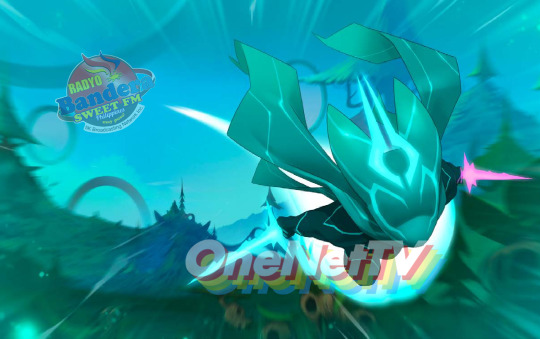
If you look at a single promotional photo, there is a possibility either a fight scenes with his magically cross-bladed weapon or the inception of a fast-teleported direction to a locally numerous portals upon heading out probably to Ingloriom or places with a new location personally on the go. The expectations from a french cartoon of Wakfu might get a bit challenging for a kids show in advance, as under the rules from the Movie and Television Review and Classification Board (MTRCB).
Unfortunately from a kids block of Okoo on France Télévisions, there is a catch. France 4 and France Ô will officially having a Final Broadcast probably on Free TV, Digital TV or both starting in late mid-August 2021 as Le Parisien reported in a news article. Françoise Nyssen, a former Minister of Culture was announced in June 2018 says, a televised cost-cutting from a double broadcast closure should allow France Télévisions to save money. Educational and/or Cartoon programming may have a last resort for some time, France 4 and France Ô recalls in extremis the role as a public broadcasting station (which is owned by a French Government).
Okoo will continue to serve in most of a children and teens programming either in a newer shows (Nate is Late, Rabbids Invasion, etc.) or the reruns (like LoliRock and Angelo Rules for example) of France Télévisions themselves, except for France Ô (which is an Overseas French Departments and Collectivities station in real life).
In a meantime for a post-Pandemic of CoViD19 in France, it is best to support the show and the original show creator like Roux for a new episodes straight from a production company of Ankama Animations.
The new season of Wakfu in Season 4 is coming soon -- on-air, online at France.tv, and on the France TV & Okoo APP (only if you live altogether in France).
PHOTO COURTESY: Ankama Animations & France 4
SOURCE: *https://www.gamosaurus.com/jeux/dofus/wakfu-saison-4-entre-en-production [Referenced News Article #1] *https://www.leparisien.fr/culture-loisirs/tv/france-4-et-france-o-fermeront-definitivement-le-9-aout-03-01-2020-8228559.php [Referenced News Article #2] *https://www.leparisien.fr/culture-loisirs/tv/television-france-4-ne-fermera-pas-avant-2021-03-08-2020-8363055.php [Referenced News Article #3f] and *https://issuu.com/francetelevisions/docs/mifa-dp2021-bat-page [The Exclusive Press Release from France Télévisions on a Programming Line-Up for 2021-2022 + Show Synopsis and Information Reference for Wakfu S4 on page35]
HONEST DISCLAIMER: The views and opinions expressed from a Flash Report, are not necessarily those from the Ankama Animations, Frankas Productions & Pictanovo. Furthermore, the assumptions of this Flash Report will NOT state, intervene or reflect those of our Radyo Patrol reporters. The show, the station, the management, interwebs and the network. Thanks for reading! Stay safe and may the Celestia blesses you. Later!
-- OneNETnews Team
#entertainment news#paris#france#flash report#exclusive#wakfu#season 4#saison 4#krosmoz#mmorpg#french#french cartoon#cartoon#CoViD19#OneNETnews
52 notes
·
View notes
Text
Mary and butterflies - the inevitability of death, murderous calling cards and collectors
Some ramblings with links to other people’s excellent meta, in which I suggest that butterflies (and/or moths) symbolize Mary as Moriarty’s reincarnation and or calling card, while also hint at her inevitable death.
Disclaimers: credits are below the cut. I’m not an expert in any of these topics. Thank you, @thewatsonbeekeepers for the beta. In this post I’ll be using moths and butterflies interchangeably, apologies to any entomologists.
Mary’s appearance in the show brings with it new imagery we haven’t seen prior to The Empty Hearse - butterflies. Once Mary’s in the picture, there are butterflies in some very strategic locations, all are either visually or subtextually leading to her. The show has done that previous to season 3; Moriarty is connected to some well established symbols like magpies, apples and IOUs.
When I first started reading meta I used to think these themes were a bit of a stretch, but I’ve since accepted that this is a show that puts barely noticeable phoenixes in a restaurant scene that shows us Sherlock rising from his death.
Here are some of the butterflies I spotted so far:
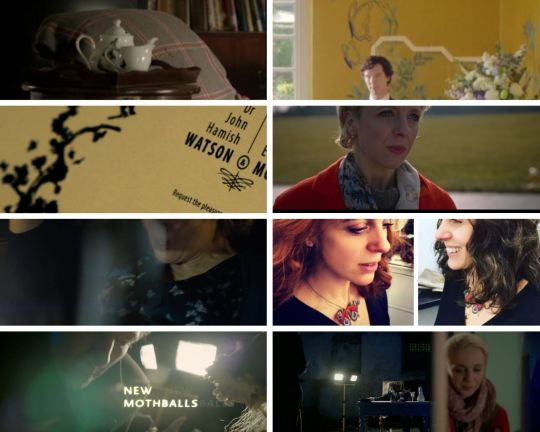
Butterflies (and in the case of this piece of meta, moth) symbolize most commonly resurrection, change and renewal. Behind the symbolism stands the transformation of a small, ungainly creature into something full-grown and unbound. In that case, in the simplest way, one could argue that butterflies were chosen to symbolize her because the ‘Mary Morstan’ persona was a stillborn’s identity that was stolen and used ‘reborn’ to create a new person.
But more than this simplistic idea; butterflies carry multiple symbolisms. When it comes to Sherlock, I and many others tend to look at Victorian symbolism, considering the detective’s Victorian roots.
I find the appearance of butterflies interesting in Mary’s context, much like I find the skull interesting in Sherlock’s. The skulls, in Sherlock’s case, serve plenty of purposes, but one of them is the idea of memento mori.
Memento mori (Latin for 'remember that you [have to] die') is an artistic or symbolic reminder of the inevitability of death. These are representations that can appear in any form of art such as paintings, literature, poetry etc. It’s a concept that existed in many ancient cultures but is also deeply rooted in early Christianity. It serves to remind people of the inevitable; that even if we choose to ignore it, not think about it, it’s always there lurking, and the purpose is not to scare us but to encourage us to make good use of our time when we’re alive. Memento mori was the philosophy of reflecting on your own death as a form of spiritual improvement, and rejecting earthly vanities.
Victorians were obsessed with the concept (weren’t Victorians obsessed with everything?). They would take photographs of the dead and keep locks of hair of those who died in mourning brooches. It is said that they found these practices comforting.
Another expression of the ‘remember that you must die’ concept was vanitas art; vanitas is a symbolic work of art showing the transience of life, the futility of pleasure, and the certainty of death. The Latin noun vanitas (from the Latin adjective vanus 'empty') means 'emptiness', 'futility', or 'worthlessness', the traditional Christian view being that earthly goods and pursuits are transient and worthless. It alludes to Ecclesiastes 1:2; 12:8, where vanitas translates the Hebrew word hevel (הבל), which also includes the concept of transitoriness.
This concept reminds me, most especially, of the skull used in The Abominable Bride, which is actually Charles Allen Gilbert's 'All is Vanity' Illusion art.
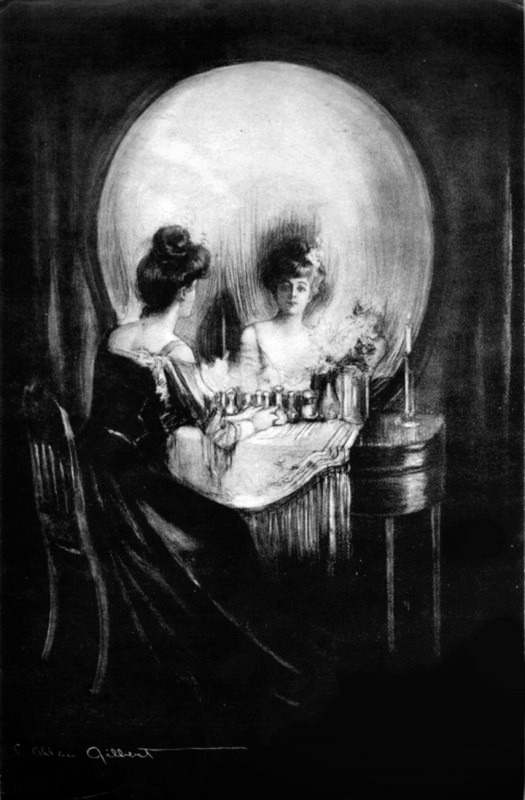
Back to butterflies - butterflies are a staple component of vanitas art - paintings executed in the vanitas style were meant to remind viewers of the transience of life, the futility of pleasure, and the certainty of death. They also provided a moral justification for painting attractive objects - in a way, it’s a justification for the vanity, or the human need of enjoyment of beautiful things. Below is a vanitas by Jan Sanders van Hemessen:

But butterflies are also considered an omen of death:
“Butterflies and moths were associated with death, sometimes merely as omens, sometimes as the soul or ghost.” These butterfly omens came in many ways. For example, in the nineteenth century United States, some people thought that a trio of butterflies was an omen of death.” [x]
Oh.
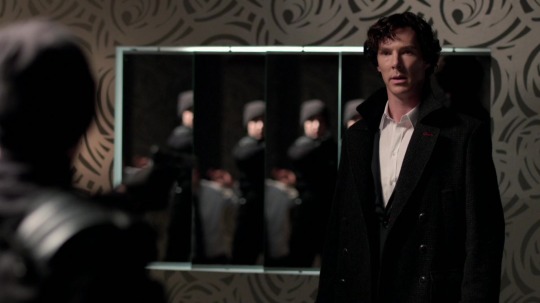
But I also think there’s more to the butterfly symbolism than Mary’s imminent death; I suggest that, in keeping with @loudest-subtext-in-tv M-Theory (suggesting that Mary was planted in John’s life by Moriarty), they symbolize Mary as Moriarty reincarnated following his death in TRF. That Moriarty had indeed not disappointed Sherlock - there was a posthumous game after all! That Sherlock was supposed to understand that while one form of Moriarty died on that roof, another had emerged, continuing the mission of burning Sherlock’s heart. Mary is Moriarty’s calling card, left behind in the crime scene. They’re different, but not separate, which is why Sherlock is so obsessed with Moriarty between HLV-T6T; he’s both wrong and correct at the same time.
So far, what I’ve suggested is that in Sherlock, skulls are Sherlock’s symbolic memento mori - the skulls are associated with Sherlock in some very significant ways.
However, Mary’s character was doomed from the start - she dies during Sherlock’s hiatus in ACD canon. I believe many fans assumed Sherlock’s Mary expected the same fate when she was introduced to the show. Although the story of Samarra is told by Sherlock, who expects his own death in T6T, Mary is the one who ends up dying.
Butterflies in ACD canon
Searching for the significance of butterflies in the ACD and BBC canon led me to a number of interesting directions in meta written by others.
The first and probably the best place to start is this meta post by @tendergingergirl, which I strongly suggest you read in full: Butterflies, Sexual Deviancy & The Bloodline Theory in The Hound of The Baskervilles.
Stapleton also has a hobby. He collects bugs…Butterflies, to be exact. This can often be seen as purely academic, but depending on the actions of the hobbyist, they can indicate more disturbing things. That of holding something vulnerable captive, treating it as your hostage, pinning it down. The torture of animals has come to be a good indicator of someone who would do this to a human. He had already shown callousness by laughing as he recounts to Holmes of ponies wandering onto the Moor, becoming trapped, and dying. In 1974, there was a release of a new edition of Sherlock Holmes stories, with the forward of The Hound of The Baskervilles written by British author, John Fowles. He is responsible for several well-known works, including The French Lieutenant’s Wife. Another, was a novel that Mason finds himself wondering why Fowles doesn’t mention in his introduction, since the villain is such a close parallel to Stapleton.(but as we have learned through the study of ACD, most writers will not come right out and say where they got their inspiration. They like for you to guess!)
A lonely young man, works as a clerk, and collects butterflies, becomes obsessed with a pretty young girl, Miranda, an art student. He chloroforms, and kidnaps her, taking her to his cellar basement, to add Miranda to his collection. That book was called The Collector. But what else does it sound like?
“So yes, I googled. From an article on the release of the movie’s Documentary. "The docu proves a poor reference point for anyone who wants to understand the literary and movie links for “Lambs.” There’s no mention, for example, of how Harris partly based the butterfly-loving Bill on John Fowles’ kidnapper in “The Collector” …And here I thought Mofftiss added allusions to Silence of The Lambs into Sherlock just for fun. SMH.”
@tendergingergirl also added this photo to their post:
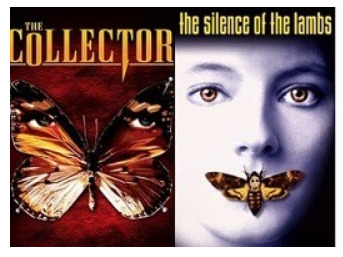
So what we have here is a chain of metatextualities/inspiration, starting with ACD’s THOB, where Jack Stapelton inspires a book about a disturbed butterfly collector (The Collector by John Fowles), which inspires a the author of Silence of the Lambs in creation of his character Buffalo Bill, a serial murderer who inserts a death's head moth into the victim's throat because he is fascinated by the insect's metamorphosis. Silence of the Lambs served as inspiration for Sherlock as analyzed by @garkgatiss in Bond, Hannibal, and Holmes (I suggest you read the whole Hannibal section) .
Let’s look again at some imagery from His Last Vow. Mary shoots Sherlock’s heart, essentially burning his heart out, and who does Sherlock meet in his Mind Palace in a very cocoon-like straightjacket? Yes, the dead dude who encourages him to die already (“one more push, and off you pop”).
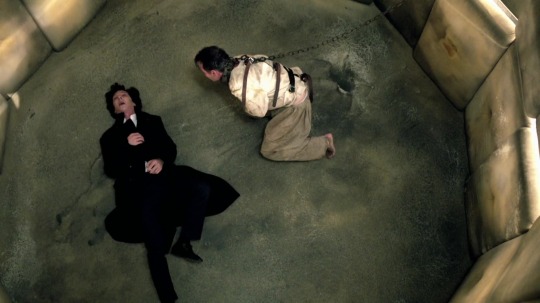
What’s the next thing we as an audience see once Sherlock opens his eyes? Mary coming to the hospital to hear that Sherlock had, in fact, survived. And what is she wearing? Her butterfly scarf, one which will another appearance later in the episode, during the tarmac scene.
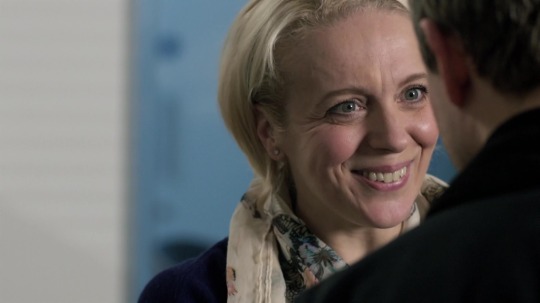
I also find it interesting that in the context of Sherlock and Silence of the Lamb, there’s an element of gender-switching between Moriarty and Mary. Buffalo Bill, the murderer from Silence of the Lambs, skins bodies of women to create himself a woman’s 'suit’; in Sherlock, Moriarty is a man-villain who transforms into a female-villain in the form of a bride and/or Mary.
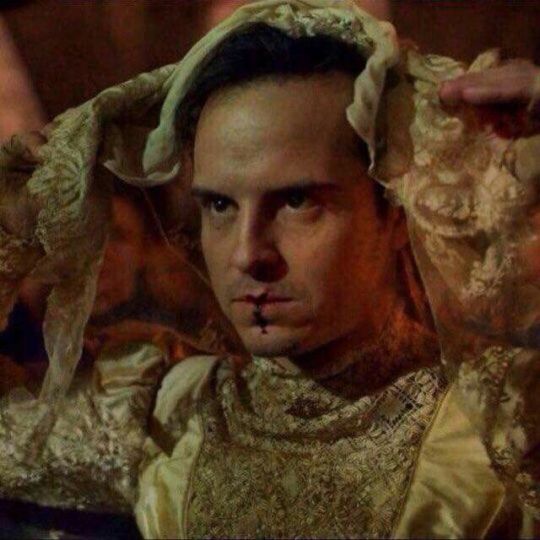
By the way, who else is obsessed with his suits?

Also, let’s not forget the worms, maggots and other such crawlers in the grave scene:

Now, let’s go over some of the photos I included in the beginning of this post a bit further.
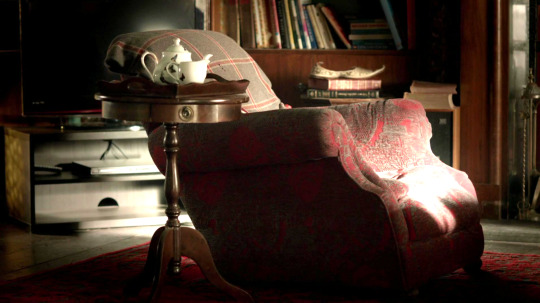
Mrs. Hudson’s butterfly tea set is first shown in TEH - she uses it to serve John tea when he comes visiting her and tellis her about Mary. We also see it near John’s chair on the day of the wedding. This isn’t Sherlock’s set - his set is different, featuring the British Isles. Moriarty drinks from it in TRF. The next tea set we see, now that Moriarty is dead, is the butterflies one. In TLD, Mrs. Hudson uses Sherlock’s tea set - the butterflies are gone.
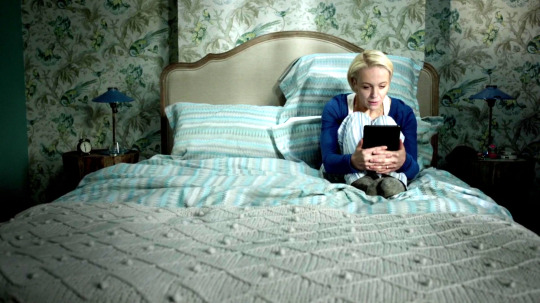
Mary’s bedroom wallpaper is very feminine, with flowers and butterflies, both complementing symbols while also very common in vanitas art. Much like Mrs. Hudson’s wallpaper in Baker Street, Mary’s wallpaper is supposed to show the contrast between Mary’s flat/Mary and Sherlock’s flat/Sherlock.
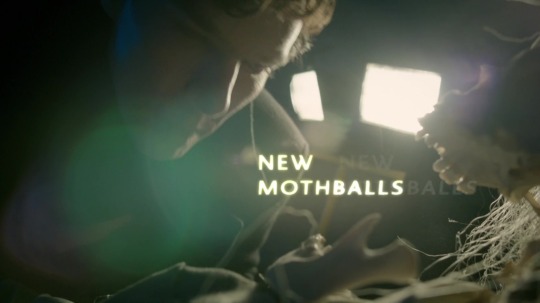
There’s an interesting moth reference in The Empty Hearse, which in my opinion, is Mary & Moriarty related. In short, in a previous piece of meta I wrote, I suggested that the Jack the Ripper case in TEH is subtext alluding to Mary’s skeletons, which Sherlock ignores because he’s upset by his reception by John. And what’s one of the first things Sherlock notices about the skeleton? New mothballs smell, hinting at an attempt to get rid of moth/butterflies - maybe a hint to the fact that Sherlock has a chance to discover the truth about Mary but misses it. Also, in the context of Mary and the Jack the Ripper case, notice this transition:
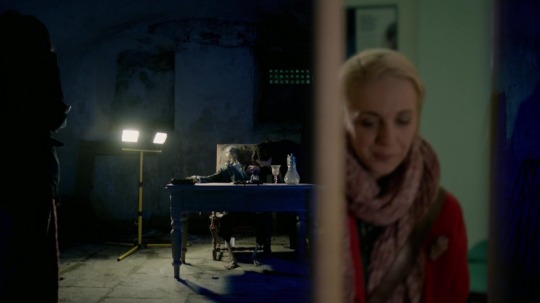
Transitions are important on Sherlock - they’re nearly always there to draw our attention.

This, I think, is perhaps the most telling about a possible connection between Mary and Moriarty: we have both magpies (a Moriarty hint) and butterflies together here. This isn’t the only hint of Mary’s past we get in the wedding; there is, after all, the telegram from CAM.

Mary’s scarf is colorful, and it appears by the time Sherlock’s subconscious suspects Mary. Mary’s black butterfly dress - an ominous dress, I’d say - is the one she wears during the labour scene in the car. The third photo is a behind the scenes photo uploaded by Amanda Abbington, although I’m unsure whether this necklace is AA’s or Mary’s (but I couldn’t pass on including this).
Interestingly, the butterflies do not appear in Rosie’s context - either because it’s a telling sign that Mary won’t be with us much longer, or because Rosie is spared being considered a part of the ‘burning Sherlock’s heart’ plan. Sherlock, on the surface, seems to love Rosie and accepts her.
Also, another BTS photograph I came across during my research which I’ve never seen before and ties nicely to the vanity topic is this one (found here):
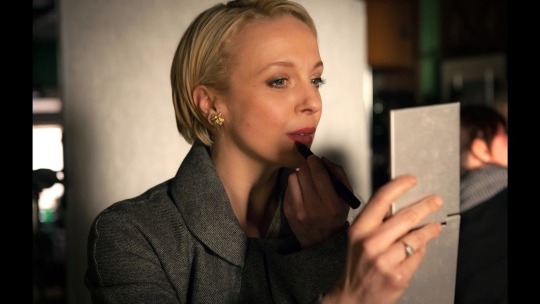
The Death's-head hawkmoth and ‘Death with Interruptions’
You’ll recall that I referenced The Collector and Silence of the Lambs, both featuring butterflies on their cover art.

The Silence of the Lambs cover features Acherontia atropos, otherwise known as the death's-head hawkmoth. It gets its name from the sinister-looking skull shape on its back. In many cultures it is thought to be an omen of death. In a bit of another coincidental but stunning piece of symbolism, all three species of the Death's-head hawkmoth are commonly observed raiding beehives of different species of honey bee; A. atropos only invades colonies of the well-known western honey bee, Apis mellifera, and feeds on both nectar and honey. They can move about in hives without being disturbed because they mimic the scent of the bees and are not recognised as intruders.
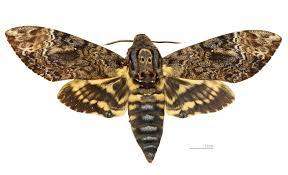
Anyway, the use of Acherontia atropos reminded me of the book ‘Death with Interruptions’ by Jose Saramago. Interestingly, this is another book about a deathly collector with a butterfly on the cover:
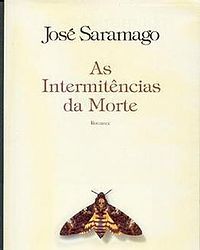
In Death with Interruptions death is a woman, and she falls in love with one of her future victims. She decides to spare his life: Every time death sends him his letter [notifying him of his imminent death], it gets returned. death discovers that, without reason, this man has mistakenly not been killed. Although originally intending merely to analyse this man and discover why he is unique, death eventually becomes infatuated with him, so much so that she takes on human form to meet him. Upon visiting the cellist, she plans to personally give him the letter; instead, she falls in love with him, and, by doing so, she becomes even more human-like.
It’s pretty common to read theories about Mary who maybe was one of the assassins due to kill John both at the pool and in front of Barts. So we have a death harbinger trying to kill someone twice and failing. She then falls in love with him.
But how does the butterfly fit in?
Well, at some point in the story, death (that’s her name, sans a capital d), contemplates that using the death head butterfly, instead of a violet piece of paper, would have sent a much stronger message to those whose death is coming for.
And here’s another last bit of coincidental reference to Sherlock: I’d argue shades of purple, among them shades of violet, are associated with Mary and her secrets. There’s the purple dress she wears in TEH, her bridesmaids’ dresses include various shades of purple (including what I would argue was a violet sash) and let’s not forget:
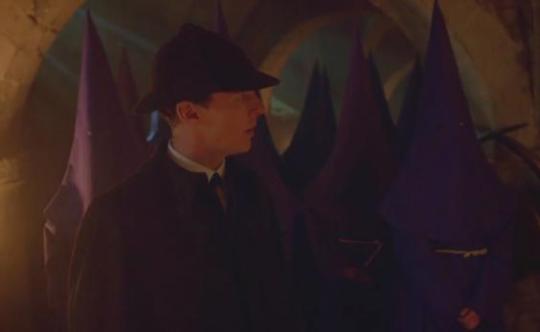
Oh and, by the way, remember the song Donde Estas, Yolanda from TEH, about a woman called Yolanda? Always thought it was a bit of an odd choice for a song?
Yolanda is a female given name, of Greek origin, meaning Violet.
:)
Thoughts?
Credits: thank you @lukessense for directing me to @tendergingergirl meta about butterflies. Episode screenshots are from kissthemgoodbye.net.
@sarahthecoat @tjlcisthenewsexy @devoursjohnlock @inevitably-johnlocked @shylockgnomes @possiblyimbiassed @raggedyblue @ebaeschnbliah @gosherlocked @waitedforgarridebs @helloliriels
#mary mosrtan#butterflies#silence of the lambs#the collector#meta#sherlock meta#tjlc#johnlockendgame#jim moriarty
88 notes
·
View notes
Text
Let’s talk TroPreCure! (^∀^ 🌺)
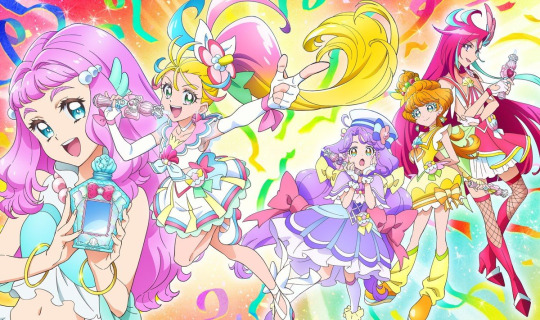
i’m so stupidly proud of this dumb pun “tropurikyua~”, hahahahaha
Last post of the year and wow is there are lot to be excited for!
I even had to make a list for the stuff I want to talk about and I’m sure I already forgot one or two things but we’ll get to them as we continue to float~ along the wave to February 28th, mmkay? :)
Now for what has peaked my interest so far. And yes, we have to talk about the following first:
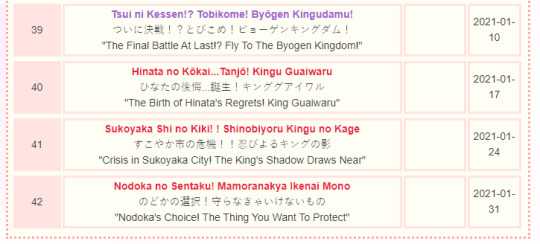
1) HealPre the shortest Precure season??
Unless they plan for double features in February (which I doubt but you never know), HealPre is likely going to reach only 45 episodes long instead of the usual 48~50 before TroPre I’m using this shortening of the title for now so if there’s a better alternative, tell me and I’ll switch out begins its broadcast.
Understandable because the producers probably want to get back to their normal scheduling as soon as possible (toy sales, y’know) and I suspect pushing the start of the new season back by a month is the most they’re willing to compromise.
As for me, I’m quite happy about this since HealPre’s lost its hold on my attention a while ago so the sooner TroPre gets here, the better. Though the downside might be a scrambled climax and a rushed, underwhelming ending for HealPre (I dunno if it’s January’s titles that feel a bit messy or if the hiatus is still throwing me off) but whatever. We’ll refresh ourselves with the new blood Cures so it’s all good.

2) Tropical movie announced for Autumn 2021, no All Stars??
(source)
First saw this mentioned on Youtube somewhere but it’s all over the fandom forums by now. I mean, HealPre’s movie is set for March, the usual time slot for All Stars release. If Toei intended for there to be an All Stars in 2021, there’s no way they would announce the seasonal movie before it so speculations of them skipping it this year are probably true.
To squeeze it somewhere between March and October-ish would force them to readjust their budgets as well and I don’t think even Toei wants to go through that extra hassle after all the trouble the pandemic’s caused for everyone already. It’s just easier to resume All Stars in 2022.
That, and I think Laura being a major character in TroPre despite not having a Cure title (yet) would make for an awkward situation when the three latest teams gather so perhaps that’s also one of the reasons. But I’ll get back to Laura in a bit.
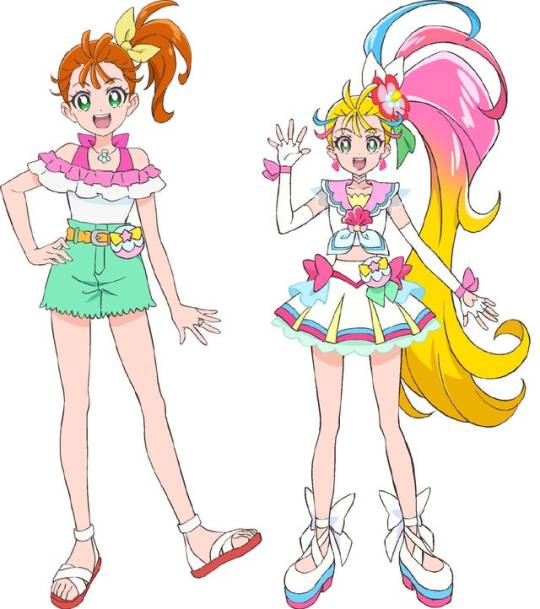
3) Cure Summer is a RAINBOW Cure
So god help me if I see anyone calling her a Pink Cure.
Yes, she’s the lead Cure for this season. NO, she is not a Pink Cure.
Look, even the official website has a rainbow overlay for her profile pic and text font while everyone else’s respective theme colors are a solid hue:

Therefore, RAINBOW.
In promotional material and merchandising, they’re probably going to advertise her primarily with pink bah and at worst, she might occasionally be labeled as a White Cure with multiple subcolors (her outfit is not pink-dominant) but definitely NOT. PINK.
...also, this goes without saying but f***yea, we finally got a lead Cure practically and unabashedly wearing the LGBTQ flag and you cannot tell me otherwise, Toei!
Own up to it! Declare Manatsu/Cure Summer as the Precure queer icon!
I’m not gonna stop yellin’ until you do! 😠
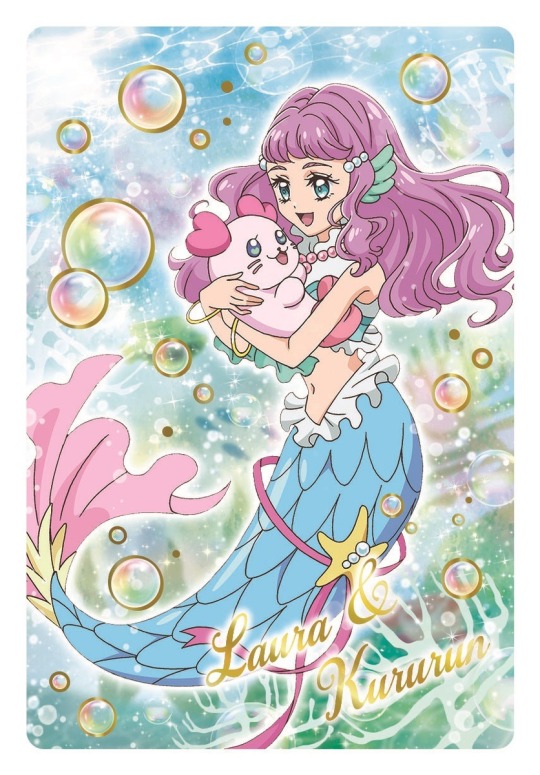
4) Laura = obvious midseason Cure is obvious
First of all, Laura is a babe. I already love her the best and she’s not even Precure yet. <3
Anyways, the set-up is pretty much in the description. Important main character who’s not a mascot, stated to have a self-confident personality and just speaks her mind (oooh, I like~ :D), magical/foreign being from another world looking for Precure to save her home, possesses her own special item(s), has aspirations to become the next Queen (so she’s a princess-candidate or something to that effect, I suppose).
We’ve seen various combinations of these traits in past midseason (and a few starter) Cures so nobody should be surprised when we all guessed that one of the Cures would be a real live mermaid.
The only question is why not just make Laura a Cure from the get-go if she’s introduced to us at the beginning (like Hime or Lala) and having a team of five with no unnecessary extra add-ons later on (like Smile).
Well, there’s a simple answer for that: formula.
Toei is afraid that if they don’t spit out some new animation sequence at the halfway and third quarter points of the show, the kids will lose interest and abandon the series altogether. Which means failed toy sales. Oh nooo... [/sarcasm]
...Yea.
And this way they can also have Laura available in the Cure lineup for the next All Stars in 2022 instead of making her sit the fight out if we were going to have one in 2021. I’m convinced that’s gotta be one of the reasons. *shrug*
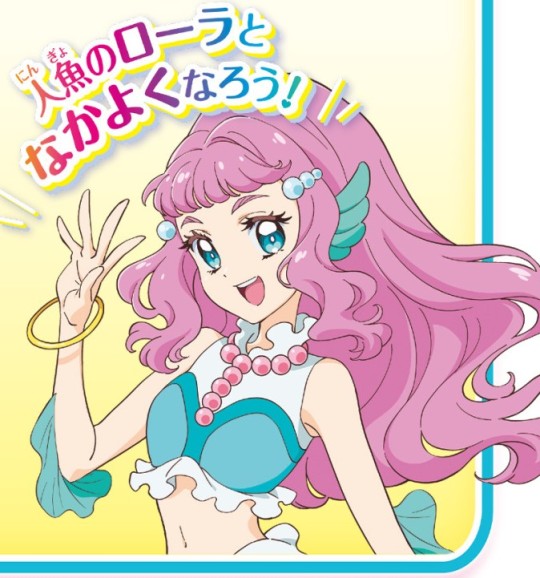
But ok, whatever. Her debut is gonna be later, that’s all. She’s a delayed Cure. Midseason Cure, same difference.
Moving along to the more important stuff now like what’s her Cure name gonna be, y/y?
Well, knowing Toei, a translation of the term “mermaid” into another language is the most predictable route even though we already have a Cure Mermaid. Not like that ever stopped them from repeating words before (ex. Cure Happy vs Cure Felice). Though if they do go down that road, I hope they opt for the Spanish/Italian “sirena” and not the French “sirène” because the latter sounds too close to how Cure Selene is pronounced in Japanese. And, putting it nicely, we all know Japanese pronunciation of foreign words is as off kilter as can be.
Hell, even the the Portuguese “sereia” sounds aesthetic as hell so it’d be nice if they can just remember there are other languages that exist out there besides Japanese, English and French when making the final decision at the writing table! *stomps foot* >:/
Alternatively, “nereid” or “naiad” are good choices too but they remind me too much of Greek myths and Laura’s from the Grand Ocean which covers more than just a couple of seas (Greece is surrounded by three, btw) so...
I dunno. But whatever it’s gonna be, she’s definitely got a strong association with water and her powers will probably be based on that.
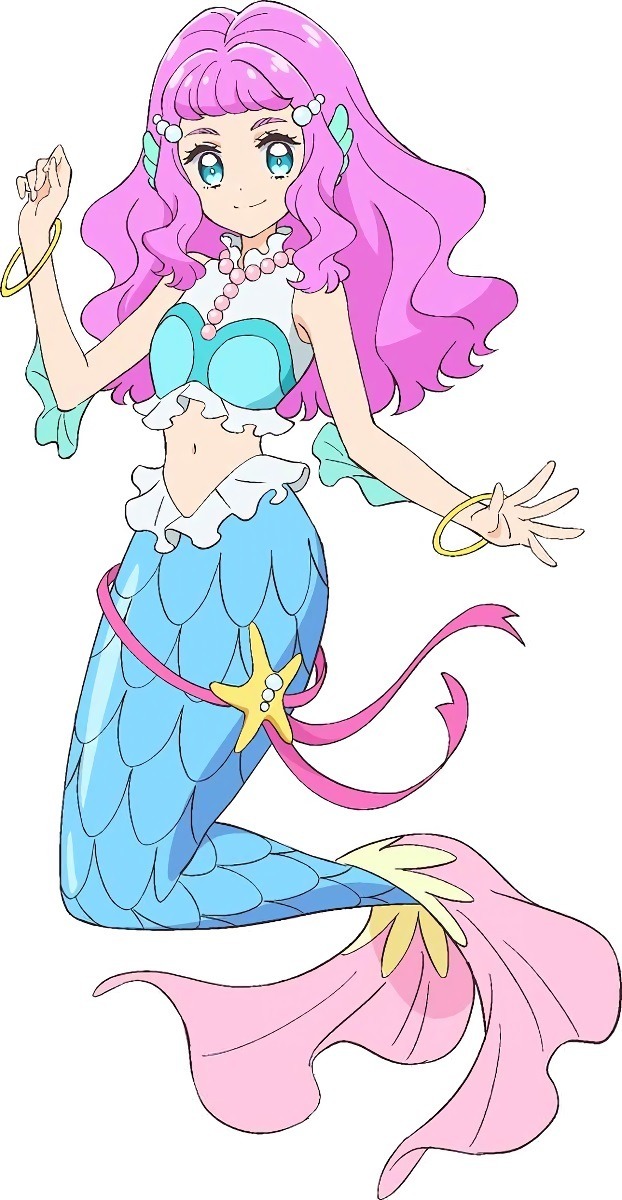
As for theme color, since there’s noticeably no blue or green Cure in the starter lineup, it’s likely she will take up that spot when she debuts around ep 20.
Pink is also open since Cure Summer, again, is technically not a Pink Cure and Laura’s hair and tail fin are hot and light pink respectively but looking at Laura’s design and concept, does anyone seriously believe that?
Her upper torso consists of aquamarine while the body of her tail is definitely some shade of cyan, implying they’re aiming for somewhere around the middle of green and blue on the lighter spectrum.
And yea, I’m aware that green and blue are considered exchangeable in some perspectives with how close some of their shades are to each other but officially, I think Laura’s gonna be grouped with the Green Cures.
Cuz of the hair. If Laura’s gonna keep it the same or a similar shade after transforming, that is. The Blues have always had cool-colored hair so putting Laura in with them might disrupt that harmony whereas if you put her with the few Greens there are (including Parfait), she’d fit right in.
I mean, we’ll see but that makes the most sense, doesn’t it?
On another note, I just want to say that I love how they added frills to her arms instead of letting her elbows go bare naked. It definitely makes her look more like a genuine mermaid than if she didn’t have them (remember, half fish doesn’t mean half the body :P).

5) Magical Items
Frankly, I’m tired of seeing the transformation device being a compact again even though one of the main motifs is make-up this season. But at least, as far as Precure compacts goes, the Tropical one is my favorite cuz of how cute and delightfully colorful its toy version looks! So I guess I’m okay with it.
The Heart Rouge Rod, though? ...I dunno. I think it would’ve been fine without that...straw (?) jutting out at the top. It looks weird, doesn’t it look weird? :S
As for the collectible clip-ons, I can live without those for the rest of my life. Yeesh.
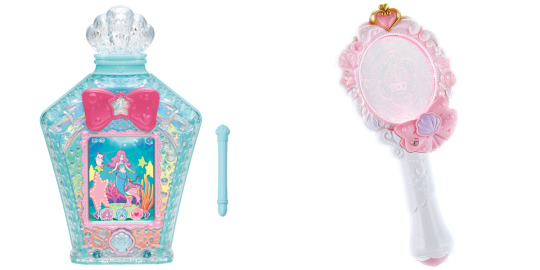
Laura’s items, the Aqua Pot and the Ocean Prism Mirror.
Again with the portable, travel-size housing. *sigh* 😩
Alright, I can let this year slide cuz Laura (I’m so soft for her, omg) probably won’t be getting legs for 20 weeks so she’s got to move about on land somehow. But unless they’re really thinking about turning this idea of carrying your apartment around in your bag/pocket/purse into a reality (cuz that would be effin’ awesome), please be more creative with your toys.
On the other hand, I’m much more interested in the Ocean Prism Mirror but from what Kusyami (the Precure merchandise reviews I follow on Youtube) said in his latest vid, this is the ED dance item so don’t know if it’ll actually have an relevance to the story or not. But I did hear him mention it having something to do with the Queen as well and since Laura wishes to become Queen, maybe it’ll be important after all? Maybe it’s her transformation device?
That’d be super cool. Let’s continue the trend of the midseason Cure having a different transformation item than the starters. Honestly, we should alternate every other year or two but we’ve gone three seasons with all of them using the same henshin gimmicks up till HealPre and I just want a break from that.

6) Fin sleeves??
These look so impractical for combat so maybe it’s exclusive to group attacks.
And/or a sort of precursor to the super forms?
*GASP* Does that mean they all eventually turn into mermaids? 🤩
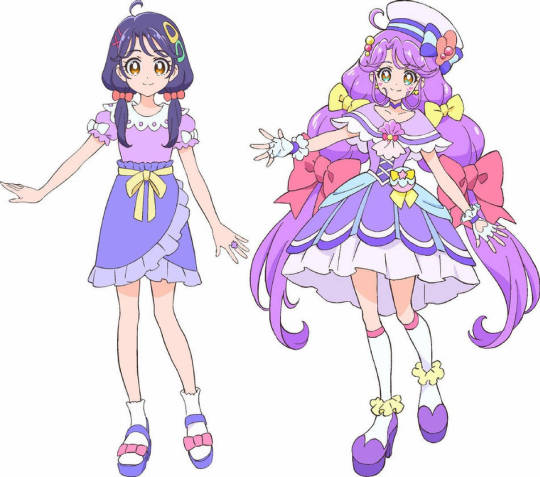
7) Yui finally became Precure!! 😭
lol, it’s all crack from this point on so don’t take it too seriously but man, after Yuni’s deceptive braids, I thought I wasn’t gonna see anything that reminded me of Yui for a while and lo behold, Sango.
kehehehehehe xD;
Though Yui might be closer to Minori in terms of personal interests (fairytales and storybooks).
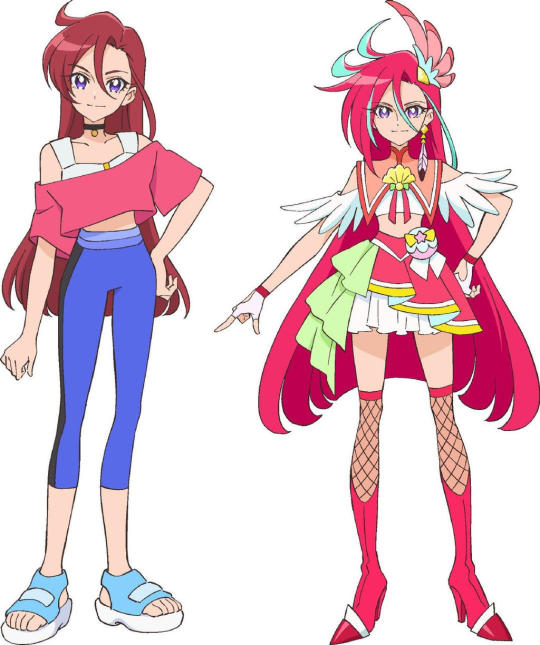
8) Akira, the actual Onee-chan version
I didn’t think this when I first saw her but once I read “Onee-san” in her profile, there’s no saving you now. Sorry, Asuka. 😅
Also, damn, do her sandals make her feet look big! Compare them to the heels she wears as Flamingo. Are they even the same?! lololol

9) ...this sounds awfully familiar...
Translation:
Tokimeku Tokonatsu! [Exciting/Thrilling Everlasting Summer!] Cure Summer! Kirameku Hoseki! [Sparkling Jewel!] Cure Coral! Hirameku Fuurutsu! [Flashing Fruit!] Cure Papaya!
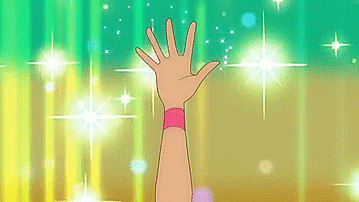
Japanese reiteration:
Mallow/Mao: Pink no tokimeki! Lillie: Blue no kirameki! Lana/Suiren: Yellow no kagayaki!
….........
@Toei
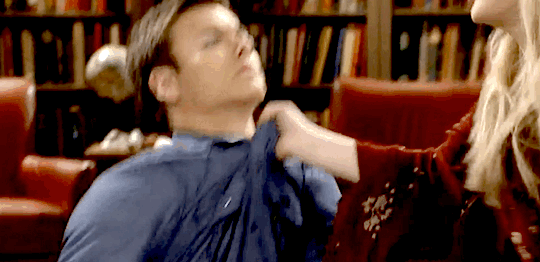
Care to explain yourselves, punks?!
୧(ʘ ∀ ʘ ╬)
#it is 1:30 AM and im hungry and still have to do work on new year's eve so i'll come back to amuse-rage later#tropical rouge! precure#precure 2021#cure summer#cure coral#cure papaya#cure flamingo#laura la mer
25 notes
·
View notes
Text
Sanders Sides episodes as Eurovision songs part 2: Eps. 4 to 6

Here comes part 2 of this thread where I associate each episode of @thatsthat24 ‘s Sanders Sides with a particular Eurovision song depending on the mood of the episode, the topic, the characters, etc. Today, it’s time for episodes 4 to 6. In this part I start including songs not originally in English, as otherwise I would be limited to songs from the Uk, Ireland and Malta for most of Eurovision history, which were the only countries allowed to sing in English up until 1999, and there are songs in other languages that fit in quite well with some episodes. In the cases where the song is not in English, I will add the full English translation of that song.

Episode 4, “A New Year of Lying to Myself... in Song”, shows Thomas trying to convince himself that he’s gonna achieve all his New Year’s resolutions, despite the other Sides and especially Virgil not being confident that he will. For this episode, I turned back to the 1980′s, exactly to 1983, as the song I chose represented the United Kingdom in that year. It is titled “I’m Never Giving Up” and it was sung by Sweet Dreams. The chorus is literally Thomas in this episode: “Baby, come what may, no matter what the people say, I’m never giving up, not giving in, if there’s the slightest chance that I can win. The battle may be lost, but I can win the war.”
youtube

Episode 5, “The Dark Side of Disney”. There was not much to choose from for this episode as, as far as I remember, only one single song in all Eurovision history mentioned Disney extensively in the lyrics. It was “Cinema”, sung by Paola, representing Switzerland in 1980. The lyrics in French say “Peter Pan was the greatest for all the little kids, and Mickey was so cheerful when he sang in the meadows, Alice in Wonderland on Sunday afternoon was blonde, was beautiful, and the film never ended.” It’s not the *dark* side of Disney, but it’s Disney and that’s as close as I could get in a Eurovision song.
Very small, sometimes he took me by the hand And happy, with small steps, I walked along the paths To the city of a thousand lights, alongside my father To the extraordinary and magic world of cinema
Peter Pan, he was the greatest For all the little children And Mickey was so cheerful when he sang in the meadows Alice in Wonderland on Sunday afternoon Was blonde, was beautiful And the film never ended
Cinema, cinema, the whole world is crazy about you Cinema, cinema, you are the king of children Your pictures and your lights Bring their fantasies to life Like a carrousel of dreams Turning and turning until infinity
Fred Astaire made me crazy When his feet clicked on the ground Charlie Chaplin, Buster Keaton And the world of Walt Disney The universe of my childhood will never leave me
Cinema, cinema, the whole world is crazy about you Cinema, cinema, you are the king of the children Your pictures and your lights Bring their fantasies to life Like a carrousel of dreams Turning and turning until infinity
youtube

Episode 6, “I’m in a Disney show”, could have roughly used the same song, but I wanted a different song for each episode, so instead of focusing on Disney, I focussed on how Thomas talked about the process of creating an episode of a show, showcasing the magic of creating art and being an artist, and based on this premise I chose the song that represented France in 1975, titled “Et bonjour a toi, l’artiste” (”And a good day to you, the artist”) which was sung by Nicole Rieu. This is part of the lyrics in English: “And a good day to you, the artist from no matter where, who makes days happy or sad, you, who changes everything. You offer us music like a present. You, magician of the new times.” Don’t tell me we haven’t thought this way about real-life Thomas more than every once in a while, and since in this episode Thomas is mainly real-life Thomas announcing his latest work, the song is more than appropriate.
And a good day to you, artist from no matter where Who makes days happy or sad, you who changes all You offer us music like a present You, magician of the new times And a good morning to you, painter of the light Who knows all the colors of the universe You're going to make from the year two thousand The most beautiful millennium in the world's history (It's time) to buy colours (It's time) to begin the work (It's time) You, the composer To give all your heart (It's time) And if you begin (Now) Tomorrow it'll be ready (It's time) You do what you want Take all your time (But don't take too much, please) And a good morning to you, artist, the great author The brilliant illusionist, the famous actor You're going to change the world for us, you're going to sing To make us forget the past (It's time) to buy colours (It's time) to begin the work (It's time) You, the composer To give all your heart (It's time) And if you begin (Now) Tomorrow it'll be ready (It's time) You do what you want Take all your time Take all your time
(It's time) to buy colours (It's time) to begin the work (It's time) You, the composer To give all your heart
It’s time
youtube
And this is it for part 2. In a future part, episodes from 7 to 9.
Part 1 - Part 3
4 notes
·
View notes
Text
My crackhead dissertation about QOTS S4, hidden connections, and the return of James Valdez!
I want to start out by saying these are all THEORIES. Mostly from my crackhead brain, but there are a few things that MAY actually tie my theories together. They are mainly fueled by my love for James Valdez and my unwillingness to believe that the writers, producers and cast would be stupid enough to really write him off the show. (the only time I accept that is when its the actors wishes. And if it was Peter's wish, I would respect that.) But in this case, I don’t think that’s what is happening here. I also want to mention here that when it comes to flashforward scenes in Queen Of The South, I don’t buy into them and I don’t believe they are actually real.I believe they are metaphorical warning rather than an actual depiction of teresa in the future. Thats my personal opinion/theories. With that being said, ALL OF THIS is just that, my opinion.
First of all, I know a lot of people (myself fucking included) are nervous that there WONT be a return of James Valdez. But please, don’t worry until we know something concrete.
I know a lot of people have seen that NOTHING has been posted on social media about James. Not by the cast, not by peter, nothing. But we have to remember It is really common nowadays, in the age of social media, for networks and producers to place a gag order on actors/cast/crew about the return and fate of certain characters.
So first of all, the main reason I firmly believe there WILL be a return of James Valdez, is because of the way season 3 ended. I wholeheartedly believe that it wouldn’t have ended that way, had there not been a REASON. For the most part, as for storylines QOTS has been extremely cohesive and able to have twists and turns, along with callback to previous seasons /relationships etc. If they were planning to kill off James, they would have left it at their goodbye scene in 3x13. But instead they showed an incredibly powerful scene of James, a soldier and sicario, giving up his gun for the person he loves and will die to protect. If they didn’t plan to incorporate that entire storyline back into the following season(s), it would not only be uncharacteristic of our QOTS writers who are notoriously cohesive when it comes to storylines, but it would also be incredibly STUPiD. There was no reason to add that James/Devon scene if they weren’t going to call back to it at some point. It was a huge, super poignant scene and I believe that it was put there for a reason. (though it does sometimes happen, lookin @ you ‘The Magicians’!)
So quite a few of my theories lie in episode 3x05, so I will be calling back to it a LOT. Get used to it. Don’t @ me.
3x05 truly solidified the trust between James and Teresa. In the beginning of the episode, they were sitting together cheersing their business while teresa looks at planes. Teresa says,
“Now if they come for me, ill be ready.”
James looks at her earnestly and says, “If they come for you, I’ll be ready.” (Implying he’d die before letting “them” get to her).
Later in the episode, when they learn that Kellyanne is being held hostage by Devon, Teresa instructs James to stay in the car, knowing that if he were to go in there, he would be killed on the spot because he hurt Devon’s business. She tells him to go to ‘la commission’ for help. Instead of listening to her and staying in the car, when he sees things go south, he walks in there himself and which basically translates to “Take me instead”. After agreeing to leave with Devon, James asks to tell teresa himself that he’s leaving. He informs her that She and Kellyanne are free to go, and that Devon will back off her business. Teresa asks what Devon gets in return, what the catch is, and the answer is James. To which teresa immediately says, uh “No”.
Devon asks Teresa, “Are you willing to sacrifice everything, including your life, for this man?”
To which she easily answers, Yes. Devon forces James to tell Teresa what REALLY happened in Texas, and asks if she still wants to put her life on the line for him. She answers “take him” (and you can visibly see James heart break). But she quickly tells James that she isn't going to let them take him, and that she was just buying time, and grabs the guns stored close by. James looks panicked, knowing that if they try and shoot their way out, they'd both end up dead. He tells her “We’re outnumbered, we’ll never make it.” And she answers simply, “Then, we don’t make it.” Showing that she is willing to go down swinging and die right along side him.
This interaction solidifies their trust in one another and shows how deep their feelings for one another go.
First theory- Devon has ties (possibly family ties) to New Orleans/Dumas
So we learn in 3x05, that Devon works with his family when it comes to his less than legal activities. While Devon is a CIA agent, his family (I believe) are civilians. His sister often acts as his enforcer.
Now, in 3x05 when Devon and Teresa have “dinner” together, devon steps away to take a call. Teresa observes her surroundings, taking in devons crew- who are speaking what seems to be hatian or some type of creole. Teresa looks at ‘The Professor’, Devon's sister, and asks “Are you Hatian”, to which his sister gives a weird look, asking Teresa what she said. She repeats herself, and says “Are you hatian? You sound hatian.” Teresa gets a “mind your damn business” type answer. But my point is that Teresa very OBVIOUSLY pointed out that she appears to be speaking hatian or some type of creole.
Now, in 4x04, Marcel Dumas sends his men to raid Teresa's factory. They shoot up the place, but before they go- they leave behind a voodoo doll. Now you don’t need to know much about New Orleans to know that there is a strong afro-french/hatian influence there. Creole and Voodoo often go hand in hand. The use of hatian/creole along with the voodoo doll, lead me to believe that there is some sort of connection between Devon and New Orleans. I believe, especially given what happened in 4x04, that the war with Marcel is going to BLOW UP. Possibly bringing either Devon (if he has ties to marcel or to NOLA) or possibly Castel into the picture, and that is how teresa and the team may learn that James didn’t leave on his own volition, but instead did it in order to protect Teresa.
Back to 3x05 for a minute, as I was saying earlier when they looked into Devon’s sister, because she was a civilian she had an internet presence, and they were able to find out where their mother was located and used her as collateral against the siblings. Lil tay, who was the one to go and threaten devon's mother. When she's sitting in the church, she talks about how she was impressed that the van she was driving could hit over 150mph on the highway. Telling me that she wasn’t just kickin it around phoenix, she had to have traveled a pretty long distance. Because we don’t know how long this whole sequence took it is *plausible* that his mother was located in louisiana/new orleans as well (it would have taken 6-8 hours traveling at 150mph). The song that the church choir was singing “Wade in the Water” also has strong ties to the black community, which I think is important to point out as well.
I don’t know if this is planned, if these certain points were added as fillers or if they really are important and will tie together all of these strings, while paving the way for James to come home.
The Devon and Castel Connection
Now we know that in 3x13, in the scene with James and Devon, they talk about how Devon killed El Santo to take out the competition for the columbians. Devon tells James that Castel is a “friend of the agency” meaning basically that they’re in bed together on whatever operation Devon is running (legitimate or not). We already saw that in 4x01, Teresa pledges allegiance and loyalty to Castel, who showed up in new orleans.
So the fact that James went with devon, whether he’s working for him to pay his dues or if he’s more being held captive, I honestly have no idea. I DO believe based on the title of 4x13 ‘They will come for you.’ is a callback to Teresa and James’ conversation in the beginning of 3x05 (where he says, “if they come for you, I’ll be ready) . So I don’t know if they will rescue James or if James will end up rescuing her but I am praying that there is an OBVIOUS connection there for a reason. ( thank you for your later episode theories, I AGREE! @mymostimaginaryfriend )
But the fact that Devon and Castel are in bed together ALONE tells me they are going to be calling back to that at some point, especially with Teresa pledging allegiance to Castel/the columbians. That is probably enough of a connection for Teresa to end up finding out what REALLY happened with James. (I still believe in the Devon/ New Orleans theory though.)
So where does James come in? Honestly I dont know yet. I do strongly believe he will be back. He wouldn’t put his life on the line to protect teresa without them calling back to that storyline, honestly. It would be really dumb for them not to.
@folie-lex pointed out that James is almost always seen as an equal to Teresa. For just being a sicario, he is able to call her out on her bullshit and point out how they should maybe look differently at the situation. That's an important power dynamic, and that is something that is so far EXTREMELY lacking in season four not just between Teresa and James but for the entire team. James would have NEVER pulled what Javier did in 4x03/4x04. Never. The current team that she is working with, she has no one to use as a sounding board when it comes to the *hard* decisions. She doesn’t have that same rapport she had with James with any of them. No, not even pote.
While teresa can rely on Pote, to do what he is told when he’s told. Pote is a loyal soldier, but James was able to both follow orders but also turn around and challenge Teresa in a way no one else ever has. In a way that helps her keep hold of her humanity.
If you've watched the current episodes, especially 4x04, then you know that it is a SHIT SHOW. Everything is falling apart, Javier has not only killed one of Judge Layfayettes lackeys, but in addition to doing that and then disappearing, he also got Marcel Dumas nephew KILLED, essentially triggering a gang war. Dumas will be out for blood after he learns that his nephew has been killed.
Had James been around he would have seen this coming for MILES. He would have been there as a sounding board for Teresa, as someone to clean up the mess, but he also would have kept everyone in line.
I understand that the network, showrunners, and writers think that action and chaos sells, but we are a rather small fanbase. Small, but loyal. For them to decide to squash our loyalty, knowing that James well loved and fan favorite, would be a (as i said previously) STUPID, and possible fatal mistake. I truly believe that they haven’t made that mistake yet, but if they were to make a permanent decision to write james off, they could be digging their own cancellation graves.
This isn’t a background, small time character. This is James Valdez. He’s been here since DAY ONE and gave an extremely vital structure to the show and added greatly to the dynamic between characters and the team. There is a visible, palpable James sized hole in this season and I hope it’s there to prove a point in how much he is needed, rather than to squander a well loved and respected series regular.
James Valdez has a big, protective heart, and is willing to die trying to protect the ones he loves, his family. Lets try to have some faith that this is all for a reason and that james is going to get the storyline and love he really deserves.
#queen of the south#qots#Meta#theories#jeresa#james x teresa#james valdez#teresa mendoza#javier jimenez#king george#qots season 4#qots spoilers#qots theories
54 notes
·
View notes
Text
Joining the Game Late: S3E1 “Valar Dohaeris”
Synopsis
Sam had one job. Jon gets a cold reception and meets his bear boyfriend-to-be. Bronn demands a raise. Davos is stuck on a rock, gets saved by a callback, and then screwed again by Melisandre who’s been very busy in his absence. Robb besieges a Harrenhal full of corpses. Tyrion continues to get no respect from his family. Littlefinger has a cunning plan for Sansa. Dany and her dragons love the sea - the Dothraki not so much. Margaery and Loras bring the Reach to King’s Landing, scandalizing Cersei and impressing Joffrey enough to make him somewhat civil. Dany is in the market for a paramilitary force of castrated slaves, but there’s a language barrier that everyone gets to play around. The Mother of Dragons is almost assassinated by a small child, but fortunately a callback from Season 1 rescues her.
Commentary
Season 3′s start is extremely busy, like many of the episodes of the previous season, and that’s probably not going to be changing anytime soon as the number of characters and plotlines continues to build. Thinking about it, this does make for a solid (re)introduction to how GoT operates for those coming back to the show after however long it went on hiatus between seasons, because it features a bunch of the usual: a cold open (pun intended) with ice zombies, sexposition, gratuitous violence (that is not how you do nipple play), convoluted King’s Landing intrigues, lots of time spent with the two most important protagonists Jon and Daenerys, stuff brought back from previous episodes/seasons in a more significant capacity that requires you to retroactively remember it, and as mentioned entirely too much to follow at once. I’m going to be more reasonable and pick two of them to talk about for now.
Naturally, let’s start with Westeros’s French analogues. Margaery (and also Loras, who’s just kind of there) does not disappoint in her first proper appearance in the royal court, showering the Red Keep with the bounty and relaxed fashions of the Reach while also taking time out for some politically savvy charity work that earns her some passive-aggressive sniping from Cersei - who has previously made her hatred of commoners very clear - and something weirdly like respect from Joffrey. I just love the dinner scene in general, because so much of the antagonism between Margaery and Cersei comes in the form of those sorts of backhanded compliments and double meanings*. Both women have good points, whether it’s about fashion or the wisdom of walking around unprotected in the slums of Flea Bottom, but it’s interesting to see Cersei thrown off her game by another woman for perhaps the first time. I also caught Margaery’s line that the reason they were traveling through Flea Bottom is that they were returning from the sept (read: church), and while there’s been nothing yet to determine the sincerity of her devotion this makes it delightfully easy for me to read her as a socially intelligent not!Frenchwoman using performative public piety and good works to bolster her good image with the common people and religious of King’s Landing even if she may not really care all that much about any of it. That’s a kind of deceit I don’t think Cersei is even capable of understanding.
*Another, unrelated, instance of this is when Tywin refuses to give Tyrion rule of the Lannister seat of Casterly Rock in such a way that it’s not clear if his rejection is based on Tyrion’s dwarfism or his dissolute lifestyle. Tywin thus comes off as a bigot twice over, but a politically canny one.
Over in Essos, we see the return of Dany’s hatred of slavery after a season of absence, but the way it’s handled here is...odd. Granted so much about her scenes in this episode work very well, from the camera and CGI work that contrasts Dany and her dragon vibrant and colorful on the stern of her ship with the bedraggled and seasick Dothraki spread out across the deck below her to the fun with translation and subtitles going on in the scene where Dany meets the Unsullied. Even the assassination attempt that closes out the episode by bringing back a minor character who last appeared when he was dismissed from King’s Landing in the first season comes off effectively, in large part because they don’t skimp on the necessary exposition to remind the audience of who Barristan Selmy is. Rather, what’s off about this plotline so far comes from the nature of the Unsullied and how they’re used to demonstrate to the audience the nature of Essosi slavery. In attempting to acclimate her to the idea of buying slaves, Jorah argues that Dany will be a better master for the Unsullied than their current one. Appeal to the benevolent master myth aside, this is such an unusual place to kick off the character’s reputation as a breaker of chains because the Unsullied are vastly different from slaves used as common laborers - that is, slaves who could reasonably adapt to lives as free people under a master/leader opposed to the idea of owning them. As their current master explains to Dany, the Unsullied are a fighting force subjected to physical mutilation and extreme psychological conditioning to strip from them all fear or sense of morality or desire to do anything other than loyally serve. I’m aware that at least one among them becomes a significant character later on, but even so making this Dany’s first stop on her chain-breaking tour of Essos plays perfectly into what we’ve known about her all along - that her primary motivation is and has always been returning to Westeros to take the Iron Throne that she believes to be her birthright. Now it looks like she’ll be doing it with an army whom she may nominally turn into free men and so prop up her secondary, more heroic-sounding motive, but how free could they truly be when they’ve been so broken in the name of perfect military service? I suppose I’ll have to wait and see.
Final note: Jon meets Tormund in this episode, and he’s large and hairy and I’m not seeing the appeal unless it’s a continuation of his thing with redheads. You do you, Jon Snow.
3 notes
·
View notes
Video
youtube
#druck #skamfrance #skamnl
s o c i a l @wasab3 (IG) @noahcoma (TUMBLR) @noahcoma (TWITTER)
--- S K A M F R ---
SKAM FRANCE (also know as Skam France/Belgique), is the French international remake of Norwegian Skam. The first episode was aired on February 5, 2018, being the first international remake to be released. The series has been renewed for a third and fourth season both consisting of 10 episodes, depending on the success of those seasons there could be seven seasons in total. The third season will commence on January 19, 2019 and the fourth season will premiere after the Season Three finale.
Imane Bakhellal, central character in Season 4 and main character in Season 1-3, based on Sana. Portrayed by Assa Aïcha Sylla. (Instagram: goodgalimane)
l i n k s and ohter i n f o at: https://skam.fandom.com/wiki/Skam_France
p l a y l i s t s
songs for your perverted mind: https://open.spotify.com/user/j1ysspdcyfshizk082yqbdkoe/playlist/365Wi65GMraLysTLbBf2rT?si=ROK0RlYaQYGjoThwh8ZR9Q
dear eliott demaury: (i listen to this playlist a lot) https://open.spotify.com/user/j1ysspdcyfshizk082yqbdkoe/playlist/5f6j8RXZGbqHuRTRcp3kAN?si=_lpsyMU-RbWsAm_jZ50W1w
skam france: zero chill: https://open.spotify.com/user/j1ysspdcyfshizk082yqbdkoe/playlist/4Rp6psvAMCbiegtcnqX14s?si=3ZZcED25S3aWFErTI8cokw
--- D R U C K ---
Druck (translation: Pressure, also known as Skam Germany), is the German version of the Norwegian Skam. The first episode was aired on March 23, 2018, being the second version to be released. The second season commenced on December 17, 2018. The third season premiered on March 9, 2019.
Matteo Florenzi, main character in Season 1-2 and central in Season 3, based on Isak. Portrayed by Michelangelo Fortuzzi. (Instagram: matteohno).
l i n k s and other i n f o at: https://skam.fandom.com/wiki/Druck
--- S K A M N L ---
Skam NL (also known as Skam Dutch or Skam Netherlands) is the Dutch international remake of Norwegian Skam. The first episode aired on September 16, 2018, and is be the fifth international remake to be released. The series has been renewed for a second season, which premiered on March 18, 2019.
Liv Reijners, central character in Season 2 and the main character in Season 1, based on Noora. Portrayed by Zoë Love Smith. (Instagram: livreijners).
l i n k s and other i n f o at: https://skam.fandom.com/wiki/Skam_NL
#skam france#druck#skam NL#skam france season 4#druck season 3#davenzi#skam nl s2#skam netherlands season 2#dutch skam
26 notes
·
View notes
Note
Hey I'm just getting into Baccano and I know there is the anime and some light novels (and maybe some other things?) but I have no idea where to start. So I was wondering if you could help me?
I certainly can try, anon!
I can’t quite tell if you have or haven’t watched the anime, but either way it sounds like I should start with the basics.
Since I’ve gone over this information before, and since this will likely be a relatively long post, I’ll respond under a cut/Read More. The first section provides an overview of the series (source material + related media), and the second addresses how one might get into the series (Where to Start). I’ll probably have a links section as well…
Baccano! Basics: Source Material and Affiliated Media
Baccano! is an ongoing light novel series written by Ryohgo Narita and illustrated by Katsumi Enami. The first volume, The Rolling Bootlegs, was published on February 10, 2003 after tying for the Gold Prize in the 9th Dengeki Novel Award Competition. There are currently twenty-two volumes and counting.
For years, the only way many Anglophone fans (including myself) could read the novels was through the much-appreciated work of fan translators. However, in 2015–much to fans’ shock–Yen Press announced it had licensed the series; it has so far published the first ten novels, with Volume 11 expected this summer.
You’re right that the anime isn’t the only related media out there, and I’ll list them below. Starting with the anime, of course–the most well-known of them all.
2007 Anime Adaptation: This adaptation, which originally aired from July to November 2007 on WOWOW, was directed by Takahiro Omori and produced by studio Brain’s Base. It has thirteen aired episodes, and three DVD specials (OVAs). These OVAs essentially serve as Episodes 14-16; I recommend them.
The anime covers less than a fifth of the currently published content in the light novel series. Here’s a quick idea of what it adapts–I’ll elaborate after:
Volume 1: November 1930 timeline in the anime
Volumes 2-3: December 30-31, 1931 timeline in the anime
Volume 4: December 1931-January 1932 timeline in the anime. Technically, except not really. (More on this below.)
The OVAs: January 1932. They’re linked to the first gaiden novel, which Narita would eventually turn into Vol 14 of the light novel series.
Misc: The anime also borrows/modifies some dialogue/ideas from other novels, such as Volumes 5 and 8.
The anime takes those three main timelines (1930, 1931, and 1931/1932) and intertwines them, telling three stories in a simultaneous, non-linear fashion.
Note that it severely deviates from Volume 4′s plot–so much so that I usually hesitate to say it truly ‘adapted’ the volume. It also cuts characters from all three timelines, changes scenes and deletes others entirely. The events from Vol 1 are condensed from two days and one night to one day and one night (and thus changed up); I’d also say a couple characters aren’t entirely representative of their LN selves.
The anime has English and French dubs, with the former having a reputation for being one of the better dubs on the market. Fantastic jazz OST, great OP and ED.
2006 Manga: This two-volume manga by Ginyuu Shijin ran from 2006 to 2008 in the Dengeki Comic Gao! magazine. It involves the events leading up to (and some events on) the Flying Pussyfoot (arc from Vols 2-3), and is important to know about because it introduces the characters Jacques-Rosé Boronial and Rosetta. Ah, and it’s rather infamous for its art style and character designs, some of which don’t reflect Enami’s designs.
Only the first three chapters and last chapter of this manga have been fan-translated.
2015 Manga: This manga, by Shinta Fujimoto, ran from 2015 to 2017 in the Young Gangan magazine. It has three volumes and twenty-two chapters: the first volume contains a new mini-arc (1927/San Gennaro arc), while Volumes 2-3 are a relatively straightforward adaptation of The Rolling Bootlegs. More faithful adaptation of TRB than the anime.
I consider Volume 1 a must-buy for fans, since the 1927 arc is canon as of LN Vol 22. And since it’s just a great time, haha. I recommend the whole thing, frankly; like I said, Vols 2-3 are the most faithful visual adaptation of TRB we’ve had yet, and have quite a few nice little details for dedicated fans.
All three volumes of this manga have been officially translated by Yen Press.
NDS Game: In 2008, MediaWorks released DS Dengeki Bunkou ADV: Baccano! – an adventure game/visual novel which has players play through the events of the main Flying Pussyfoot arc. The bulk of the game is the unabridged text of LN Vols 2-3; however, throughout the game, the player is presented with various opportunities to choose what certain characters do next.
There are canon and non-canon choices to make, and picking non-canon choices will lead to a variety of non-canon endings (all written by Narita). There are 59 endings in total, with the first three being canon.
Ending #3 has been transcribed into English; I recommend reading it after one finishes LN Volume 14.
First Audio Drama: This JP audio drama (which has a name that’s long) was originally a radio drama which aired in 2005 and sold in CD format in 2006, and it retells the events of the FPF arc (Volumes 2-3). Some cast members reprise their roles in the anime, but many do not.
Second Audio Drama: Firo Prochainezo Witnesses the 53rd Death of Pietro Gonzales (released 24 Oct 2007 by Movic), introduces the characters Pietro Gonzales and Dominico Fuentes (along with Antonio Baro and Elita) and tells the story of what happened to Firo, Luck, Isaac, and Miria in Summer 1936.
You can listen to this one online; it’s in Japanese, but summaries of each track (and occasionally transcriptions/translations) have been posted.
Baccano! B.C.300 ~Notorious B.E.Ginning~ is a short story about Ronny Schiatto’s origins. The story has various parody elements (due to having been published in a magazine issue w/a parody theme), but the general gist is canon. Referenced/summarized in LN Volume 22.
There are some other minor media one may as well know about (like the short story about Czes in Enami’s first artbook, or the trading cards, or the Euro Historia tie-in, etc) but this section is already long and the above are the Major Stuff to know about. Better not to overload you anyway sorry if I already have.
Where To Start
Oh jeez, I hear you think. That’s a lotta things Rev threw at me just now.
Whoops. Don’t worry–there aren’t a plethora of viable starting places to choose from or anything. If you’ve seen the anime, then the next step is to read the light novels (aka the source material) starting from Volume 1. Simple as that.
If you haven’t seen the anime, then all you have to do is choose between ‘getting into’ Baccano! via the anime or the light novels. Honestly I don’t have a firm, ‘my way or the highway’ opinion on this?
I mean, while I’m obsessed with the light novels, my first introduction to Baccano! was the 2007 anime adaptation (English dub). I’m far from the only one (in this Tumblr community but generally speaking, too)–most anglophones are in the same boat.
It’s not a bad way to get into the series. Of course, I’m someone who knew the anime would be right up my alley from the premise/blurb alone and was hooked from Episode 1 (which not everyone is enamored with)–so, uh, disclaimer.
Still, the anime has the advantage of only being 16 episodes long (’advantage’, haha Suffering)–which means you’ll finish it a lot faster than you will all 22 LN volumes currently out. And considering that the anime only covers the first few novels, well…by the time you catch up to the latest volume and fire up the anime, chances are you might be a bit fuzzy on those first few volumes? As a newcomer?
That is, there’s something to be said for experiencing the anime and then experiencing the source material version of the anime content soon after. That way one’s more aware of the changes, and more able to directly compare the anime & source material side-by-side. I believe I’d already rewatched the anime at least once before I dove into the fan-translations, but having the anime still fresh in my mind made me all the more indignant when I realized what the anime changed/left out.
I think there’s also something to be said for experiencing the anime first w/o comparing it to the LNs in your head? The anime is a wild ride from start to finish, and as a first-time viewer each episode left me wanting to know What’s Next on Baccano!. I was hooked, I tell you. Certain scenes simultaneously bowled me over and yet on the edge of my seat. I’m glad I didn’t know what’s next on Baccano!, and I guess I would have had I read the novels first.
Rewatching the anime before I read the light novels was also rewarding, because I noticed things on my second watch-through that I hadn’t noticed before–which was enriching and satisfying. And when I came back to rewatch the anime after reading the light novels, I discovered new things I hadn’t known as an anime-only. This, too, was rewarding. Even becoming cognizant of what the anime changed and left out was rewarding, albeit bittersweet.
I always do like to say the anime has one of the highest rewatch values of anime I know…
On the one hand, I guess there’s a chance that if one starts with the anime one might be disappointed with the light novels. On the other hand, there’s a chance one might start with the light novels and end up disappointed with the anime--since you’ll see all the changes the anime has made from the start.
I’m very obviously someone who not only wasn’t disappointed with the LNs after watching the anime. I’d fallen in love with the anime already, true--but I’d fallen in love with the characters and the world and I really really wanted more of those characters and their stories and... Well, look at me now; I’m constantly banging on pots and pans hollering for people to read the LNs at any given opportunity.
Reading the LNs didn’t irrevocably hurt my relation to the anime either. It’s still my favorite anime: I still love the phenomenal OP and OST; I still love the episode titles; I still appreciate the great editing and background art and directing choices; I still can’t believe it got as many good VAs as it did.
(Yes, I lament the lack of a proper Volume 4 adaptation and grumble here and there about the various changes to the source material... and yeah, I’ve talked wistfully about reboots and remakes... but dreaming of reboots doesn’t actually mean I don’t appreciate or love the 2007 anime, you know?)
TL;DR + Thoughts: If you’ve started the anime, then your next step is to get into the light novels and start from Volume 1. Read the transcription of the NDS game’s third ending after Volume 14. Once you’re caught up on the LNs? Well, picking up the 2015 manga is always a good choice! Reading one of the fan-translations of Ronny’s origin story is never a bad idea.
Aside from familiarizing yourself with/experiencing/etc the other media adaptations, there’s plenty of great fan content out there to discover? This fandom is small for sure, but for a small fandom we sure do have a high number of talented content creators. On Tumblr, to boot. Fanart, fanfiction, analyses and headcanons and idle thoughts--we’re still making it, after all this time. A dedicated bunch, we are.
If you’re trying to decide between the anime and LNs--well, I’ve provided some thoughts on it, but ultimately it’s your call. You clearly want to get into Baccano!, so I like to think either way will work out. Go into Episode 1 of the anime with an open mind, if you start with the anime; if you can’t get past Episode 1 (which I don’t think will be a problem, since you want to get into it) after multiple tries, then you can always start over with Volume 1 instead, yeah?
Personally I don’t regret starting with the anime; I can’t speak for everyone. (If there are any LN readers actually reading this post, please do share your thoughts?)
At any rate, know that Baccano! has plenty of blood and violence. Some gore, some swearing. Thankfully what fanservice there is (in both the anime/light novels) is far more minimal than other series--not to say it doesn’t exist, but...still.
Links
To wrap up, here are some links you might find useful.
/r/Baccano FAQ - Much of what I’ve said here I’ve actually written in this FAQ for the /r/Baccano subreddit. The subreddit wiki also has a Resources section you’ll find useful in the future.
/r/Baccano Resources - Eh, I’ll just link it here since you will definitely want to use some of those links in the future. Oh, by the way--if you’re using the Reddit redesign, use old.reddit.com to go back to Old Reddit.
List of Media on the Baccano! Wiki: Normally I DO NOT recommend newbies visit the wiki--and this goes for you too--since it is full of spoilers, but this list contains a list of various media worth knowing about. Including the gaiden novels, which I think I ultimately failed to elaborate on.
Again, strongly recommend you don’t visit the wiki until you’ve caught up on the novels. You can use me as a proxy in the meantime, though.
I hope this was helpful? And not overwhelming? If you have follow-up questions/need anything clarified/etc please feel free to grace my inbox again.
You’re in for a grand ruckus, anon--I’m so excited for you! If you find yourself wanting to holler about the series as you delve into it, know that the fandom always enjoys newcomers’ experiences/liveblogs/etc.
#Anonymous#Asked and Answered#Baccano!#Baccano#long post#I suppose it would be more practical to just copy and paste from previous times I've answered such questions#but here I go spending a couple hours writing up a post again
7 notes
·
View notes
Text
Fruits Basket 10 - 11 | Sarazanmai 10 - 11 (FINAL) | BSD 35 | Gakuen Babysitters OVA | Demon Slayer 11 | Shield Hero 23 - 24 | OPM 23 |
Fruits Basket 10
*sees Kagura* - Kyo! RUN! (Also, I had to google this…but “Je t’aime” means “I love you” in French.)
(TW: suicide discussion) Ohh…this is Mitchan…I didn’t recognise her, now that she’s coloured in. (I forgot that she had suicidal tendencies for the funnies…the 90s have some really nasty things in them when it comes to sensitive topics, like playing “being gay” as a joke and playing off suicide as a joke is one of the worst, I think.) Update: Accidentally mistook Mitchan for Mine, Ayame’s assistant.
Sarazanmai 10
So close to the end…I read a bunch of spoilers on what’s coming up though, so not much will be a surprise anymore…
Why do otters have hands…? (Or at least, this one does.)
Kanten…apparently it’s basically agar but with a different type of seaweed.
The chyron actually says Enta no Seishin Sekai, which translates to something like Enta’s Spiritual World. Y’know, like the world of the soul inside you or something like that.
I sort of assumed either Enta or Mabu would become a monster, based on people’s speculation, but the spoilers I read never stated anything about who became the monster/s in episode 10 (and/or 11). So this’ll be interesting.
I never thought Mabu would be going solo, although my sources did spoil me on the fact Reo would become a kappa.
Hey, I said to Irina earlier today that I knew there was tragic yaoi/shonen ai. Welp, there it is. Tragic shonen ai.
Oh…there’s a single shadow. It’s just Kazuki.
I was pleading for Enta to be saved by the dishes…and turns out I was right.
Update: Come to think of it, Reo and Mabu greatly resemble the Kunzite/Zoicite romance from Sailor Moon…right down to the “servants of the prince” thing.
BSD 35
Flashback Kyouka reminds me of Rachel Gardener (Angels of Death).
Pay attention to Mii-chan.
Fruits Basket 11
Ritsu!!!...Er, Ritsu’s mum first.
“I wonder if she knows about the zodiac…”
Gakuen Babysitters OVA
Oh…this is 27 minutes. That’s unusual.
I feel sorry for Saikawa already…
How the heck did Saikawa switch clothes so fast?!
Eh…? I didn’t expect Ryuichi to get the top grade…
Come to think of it, Saikawa is an enigma wrapped in a…blanket. Nah, I’m kidding, he’s an enigma wrapped in a mystery. (That’s how that saying goes, anyway.)
LOL, I think he sad the complex dish names just to confuse the kids…and maybe scare off Ryuichi.
Oh no, what is it now? What horrors shall we bear witness to? (sarcastic, but laughing a bit too)
Inomata…makes a really good Snow White.
Ya-who…? Who in heck is Yayoi???
Oh…if you watch to the very end, you’ll see a shot of the chairwoman as a kid! I didn’t think we’d ever get to see that.
Kimetsu no Yaiba 11
A tsuzumi seems to be a type of drum, if the kanji is anything to go by…at least, from my recognition of the kanji for “Tsuzumi”, I seem to recall that first kanji has something to do with drums. Update: Yes, it means “drum”. I recognised it because it’s the Chinese way to write “drum” – I don’t think I’ve seen it in 10 years or so, so...I’m glad I still remember it…(?)
As much as I don’t like seeing slapping a creep as humour…I feel sorry for Zenitsu…
It turns out…this show’s deliberate humour…sucks…
Hey! No suicide jokes, Zenitsu!
The sparrow talking with the crow is far too cute for me. Please protect these precious avian buddies…they warm my heart too much.
“Would you like to eat it?” So onigiri exist in this era?
Since I’m not listening to the sound (I’m in a position where I can’t listen to it, because others are in the vicinity), I don’t quite get what Zenitsu’s on about…but it makes me wonder if Zenitsu has good hearing much like Tanjiro has a good sense of smell. It makes sense since there were 5 of the Final Selection guys…although we don’t know who the 5th is.
*sees eyecatch* - Yeah, as much as Zenitsu complains…I feel sorry for him.
How did Zenitsu survive Final Selection??? The more he panics, the more I wonder that.
There’s a 3D model for Zenitsu too…I should’ve known…
Ooh, pep talk from a kid younger than him (Zenitsu)! Burn!
Okay, Zenitsu, yell it with me – BOARRRRRRRRRRRRRRRRRRR! (aka Inosuke)
Hey! Don’t just go announcing your name and rank, plus the fact you’re a demon slayer!...By the way, how do you know your rank…?
Aw, just seeing the sparrow in the bottom right corner warms my heart.
“…in front of girls…”
Shield Hero 23
“I forgot that my shield translates for me.” – Only now do I realise how dumb that sounds…
“…small islands bunched together.” – Uh, that’s what archipelago means…?
Where are L’Arc and Therese, anyway…?
The quality of CR videos has been bad lately due to the weather I’ve been getting, so…I was waiting for the video to buffer and I guessed Raphtalia was going to get drunk. She did…*sigh*
Since when does eating wine berries count as “drinking”…?
LOL, those weird birds are called “Karma Penguins”.
I thought Filo’s clothes would tear when she transformed, so making clothes was futile…? Maybe she has more control over her transformation now, so it’s less futile?
Wuh? Gahaha! A penguin suit, with a Santa hat too!
OPM 23 (S2 Ep 10)
King’s shirt says “I <3 Otaku” and I like how Saitama chose a bald character, while King chose a character that looks nicer than Saitama’s but packs a punch. It’s translating the real world into the game world for them.
By the way, Saitama’s shirt is for the Tokimeki Sisters series from earlier in the season.
It seems Metal Bat‘s real name seems to be just that.
Did Tareo keep the Almanac…in his pants???
Sarazanmai 11 (FINAL)
When Keppi says “s***”, I guess he kind of…means it. (small LOL)
Gotta love Keppi’s “dadadadadadaaaaaaaaaaarkness…”. It must’ve been fun for whoever typed it into their program to do so.
When watching in slow-mo, you can see Kazuki’s kappa dish jump off his head for a second.
Wait, so…the episode titles are all taken from their shared future…?! Oh my glob!!!
Kazuki, Enta and Toi’s pro game – brought to you by Asakusa Film, Sozoyu and KAPPA…LOL.
I never knew Sara’s princess outfit could be so…lewd.
Kapamilk, LOL.
Why is this ending only Toi…?
Hmm…is Toi 18 in this end scene???
“Quecrotte” doesn’t seem to mean anything…
How did Enta’s glasses not come off his face???
Aww…please protect this old Toi. He kind of looks like Chikai, but he also doesn’t.
There seems to be a Nakata Building in Asakusa.
I think that’s all folks. See you next time!
Shield Hero 24
Instead of romantic penguin suits, couldn’t someone have invented deep-sea magic for swimming in bikinis or trunks with…?
“Of course, even the ships were arranged for by the queen.” – Now that’s ballin’ on a budget in another world!
Oh, so cohol fruits are the names of the wine berries…
This is just a scene where the camera shakes…it looks nice, but it has a terrible sense of “action”…
Not this Skybound move again…
Not dis “they’re not the real Cardinal Heroes” shitto agen…
I already knew from CR advertising L’Arc and Therese would become Naofumi’s enemies, I just didn’t know when.
Uh, L’Arc? She’s a raccoon girl. A tanuki??? She should be good with illusions…according to stereotype, anyway.
AOE seems to mean “area of effect”.
Is Glass a hero from another world as well, maybe???
#simulcast commentary#the rising of the shield hero#tate no yuusha no nariagari#Sarazanmai#Demon Slayer#Kimetsu no Yaiba#Fruits Basket#gakuen babysitters#Bungou Stray Dogs#Chesarka watches Tate no Yuusha no Nariagari#Chesarka watches BSD#Chesarka watches Gakuen Babysitters#Chesarka watches KnY#Chesarka watches Furuba#Chesarka watches OPM#one punch man#Chesarka watches Sarazanmai
5 notes
·
View notes
Text
What Exactly is Going to Happen to Nathalie? (MLB Theory + HC)
So I got to the Mayura episode of Season 2 and 1) holy shit these episodes get more and more intense, 2) Omg all the old villains came back and I am s h o o k eth, and 3) Mayura is Nathalie. This is a great way to progress the plot to use Nathalie to not only protect Hawk Moth but to bring relevance to the other missing miraculous.
However, I still got some questions.
Like 1) What's happening to Nathalie? 2) How did the miraculous break? And 3) Where can we go from here?
One and two are a two-for-one answer package: I believe Duusu's miraculous broke in a freak accident involving Emilie Agreste. As we are aware, Emilie isn't exactly dead, but suspended in a comatose state beneath her own home in a glass coffin. But what exactly happened to her? And why is Gabriel Agreste so wary of the peacock miraculous? Based on the episode and Dusuu's wiki, I believe Emilie somehow managed to break the miraculous while in Tibet, possibly to protect a town from an avalanche or something like that, and as a result Duusu's power turned against the controller. Her bodily health began deteriorating until she was reduced to a vegetative state, and thus the same thing will be happening to Nathalie because she also used the brooch.
While thinking this over, I went back to the start where Mayura was first hinted at and I noticed something that interested me. Mayura was said to be so villainous that she made Hawk Moth look bad, and yet Nathalie knew Gabriel was Hawk Moth and that she wanted to support him. Sure her last name can be translated to "cold, heartless" in French, but so far into the series she seems like a normal, albeit stern, assistant. She vouched for Adrien to go to school, she hugged Gabriel when he felt sad, and she went as far as to even allow herself to be akumatized for Gabriel's sake.
How can such a devoted assistant somehow become Hawk Moth's boss? So cruel and evil that she casts him, who manipulated and controlled innocent people, in her shadow?
It's because of the miraculous.
According to the Wiki, Duusu's name means "soul", or it resembles the Serbo-Croatian word "duša" meaning soul. With this in mind, it's safe to assume that when broken, Duusu's miraculous erodes away at the person's soul the more the person uses it, and the body, mind, and soul are connected.
With the more and more heroes coming in, Nathalie has to turn to Duusu's miraculous in order to protect Hawk Moth, but her loyalty and devotion will result in her losing her humanity, which perfectly matches the monsters she is able to summon when using her miraculous.
Will the Miraculous team go through with this? Maybe not. Either way it is an interesting thing to think about. Tell me what you guys think!
#miraculous#miraculous ladybug#mlb#chat noir#adrien agreste#ladybug#marinette dupain cheng#mayura#nathalie sancoeur#Hawk Moth#Gabriel Agreste#Season 2#Theory#headcanon#I want to see this happen#high key#the miraculous seems so good and dandy I want to see them have negative side effects on their holders#Duusu#Plagg#Tikki#spoilers
2 notes
·
View notes
Photo

This is a nice interview with Jessica Bergeault, the base runner for Seasons 2 & 3. And yes, she did go to Canada for an extended holiday and now working on other shows in the UK. Poor thing was exhausted.
I’ve posted this before, but I liked it so much, I’m going again. Outlanderfrance on Wordpress is a great site and worth a visit if you can go via google translate on your computer.
https://outlanderfrance.wordpress.com/2017/07/30/rencontre-avec-jessica-bergeault-base-runner-sur-le-tournage-doutlander/
A mystery on the set of Outlander, there is a French woman, Jessica Bergeault, working in the production office! Séverine, our permanent correspondent admin in Scotland, met her on location, and Jessica was kind enough to promise us an interview. Promise kept despite a busy schedule, on a beautiful spring afternoon, Jessica appears smiling at the « Train Bleu » Brasserie in Paris.
OutlanderFrance Question: Can you tell us how a French woman ended up in the position of « Base Runner »on Outlander? What is your background?
Jessica Bergeault: I wanted to attend a film school. Most schools are 3 years of study with a lot of theory, but in London I could go through the curriculum in one year, with the advantage of being in an English-speaking country. I worked a little in London, but I chose to go to Scotland, where it is less competitive, and I had heard about Outlander. As I’m a fan of American series, and they generally film in North America …
I arrived in Scotland, while season 1 was still being filmed. A few months later I heard they were hiring for season 2. I immediately sent my resume, I got the job interview and was hired!
OF : Do you think the fact that there were a lot of French actors in S2 gave you an edge?
JB: Yes and no. This is an advantage, they were hiring both base and set runners, the base runners work with actors. Being French, they gave me the role of base runner. It made it easier to work with French actors.
OF : Did you help Guillaume (French tutor on set)?
JB: Not much. I let Guillaume do his job. But it’s true that sometimes it was fun in the morning to speak French or Italian with Cait, sometimes a little French with Sam too.
OF : It must be quite special to have a bilingual set!
JB: French actors speak English on different levels of course. For example Romann (Editor’s Note: Romann Berrux, who plays Fergus) speaks excellent English but for his mother, for example, I was very important and we became very close. Romann is a bit like my little brother. He has really grown and changed between season 2 and season 3.
OF : Can you tell us more about the role of a Base-Runner?
JB: I am part of the assistant directors department. In fact we are like the glue that connects the different departments together: cameras, sound, actors, makeup, costumes, drivers.
There are sets, and the base. The base is where actors’ trailers are, as well as the costumes needed during the week, etc. I’m responsible for the base, and so in the morning I welcome the actors, I serve them coffee, tea and breakfast and I get their lunch. I tell them when they need to go to makeup, or to the set, I answer their questions. If they need something, I’m there for them.
I have to know where each actor is at all time, in order to make sure they are where they need to be at the right time. If there is a button that is coming off, the actor tells me and I call someone in the costumes department.
It takes a lot of organization to knock on doors and get everyone into cars. I organize with Andy, who is head of the drivers. The atmosphere on the set of Outlander is really nice. When I was filming in London, on big productions, there were sometimes ego problems, but on Outlander, actors are all really lovely, like a big family. Of course some days more than others.
I work about 13 hours a day, 5 days a week but sometimes we can only have a location on Sunday. For example at the end of 2016 for 2 months, the week ran from Sunday to Thursday to accommodate this.
OF : What is the most unusual thing that happened to you on set?
JB: I have, several times, helped the makeup artists to remove Sam’s back prosthetics.
OF : You’re going to make people jealous!
JB: Sure, but it’s interesting to learn the techniques, it was not part of my school curriculum. But Sam and his makeup artist Wendy appreciated the help.
OF : What according to you are the most misunderstood aspects of the production of a series like Outlander?
JB: I think it is the very long hours for teams dealing with extras. The assistant directors who manage extras have very very long hours. They must get up very early, they start 2 hours before I do. There aren’t 100 makeup artists for 100 or 200 extras, so you have to send them all, and then in the evening, recover all the wigs and so on. It’s very long. The makeup for women takes about an hour and a half. The wigs are very time consuming.
My working day begins about 2:30 or 2 hours before they start filming.
I begin a new season about a week before we start shooting. I then take care of the actors who come for costume or wig fittings, and I am also present at the beginning of each block for the read-through … When an actor has only one or two lines and is not present, I read in his/her place. Sometimes I read the lines with Sam or Cait. <laughter>
Much of my work is to help the second assistant director. An important part of the second assistant director’s job is to prepare the service sheet for the next day. It is kind of a timetable: what scene we will shoot, which actors will be there, what time should they arrive at, what time they have to go to make up. Also noting the important things like « there will be 8 horses, » note all the extras, where it will be shot, etc. Another aspect of the second assistant director’s job is to call to arrange fittings.
Production visits us every day and I deliver mail and scripts to the actors’ dressing rooms. I also liaise with the office, my colleagues call me if they need something. If an actor has forgotten his cellphone in his bag in his dressing room for example, I’ll get it for him … I liaise with the set to send new actors to shoot a new scene.
It is a very varied job where you move around a lot and I love it!
OF: It’s fascinating, we know nothing about what goes on behind the scenes. It’s strange, the more you learn the more magic it becomes!
JB: After that, there is the post-production and special effects, but that’s not my department.
OF: Guillaume and Amandine have not hired you to record French voices in post-production?
JB: No. I haven’t had the opportunity to meet her.
OF : And it seems that you gave French lessons to Richard (Rankin)?
JB: Yes, he said he was taking some lessons and he was very enthusiastic when he asked me to give him a « sentence of the day ». I would give him an English sentence he’d have to try and translate, then I’d give him the sentence in correct French and he’d learn it.
OF: You know that OutlanderFrance sent Sam a French tongue twister book?
JB: Yes, I saw that!
OF : Maybe you could borrow it and give Richard some tongue twisters to learn?
JB: Yes, we could try!
OF: How is it going with Caesar, the new Fergus?
JB: It’s going great! Obviously it’s weird not to see Romann, but it’s true that whenever the actors are leaving it’s weird.
But we know when we said goodbye they will probably be there again in 2 weeks for « pickups » because often they realize in post production that something is missing or needs to be re-shot. But yes it’s true, it’s sad. Tobias also, yes it was sad …
OF Gary Lewis is known to be the biggest « hugger »of the earth, is he as nice with the team?
JB: Oh Gary, yes he is really super nice!
OF : Would you have travel or restaurant recommendations for fans of Outlander, to put on our travel blog?
JB: The Best Fish & Chips? It’s Anstruther, in Fife!
Otherwise, Glencoe is very pretty, as well as Pitlochry Queen’s view. Culross and Falkland where there were a lot of scenes shot and then Dysart representing Le Havre. The Edinburgh architecture and Doune Castle which is Castle Leoch in the series.
OF : So, have you read the books?
JB: No, I haven’t had time yet, I read summaries on the internet and Romann’s mum told me everything. But I will!
OF : We hope that we will go beyond the 4 seasons. Even up to 9? 10? But it seems that Outlander isn’t an easy production.
JB: It is true that Outlander is a difficult series to shoot, because we never stay in one place. Sets are made and broken down within weeks.
OF : To return to the beginning of the interview, as you manage lunch deliveries, is it not too complicated with all the dietary requirements?
JB: For all the team and the actors, we have chefs, and there is a menu with meat, fish, vegetarian food and the people choose. Sam gets his special sport diet delivered and I oversee that to make sure it arrives and ask if he also wants something from the cafeteria. Cait has a gluten-free diet, it used to be delivered but now she brings her own lunch, it’s easier. Sometimes, people like to go to the restaurant when we are shooting in a city. Romann, for example, is very French in his tastes and sometimes had trouble with the local food so I made sure that what was offered was appropriate, if not I would arrange with the drivers to get food.
OF : It’s not too stressful ?
JB: Oh well no, that’s my job. It’s important, we need to keep the actors happy
OF : Have you read the book The Making of Outlander?
JB: Yes, it made rounds in the studio, Sam and Cait had copies to sign, I had a look, I recognized colleagues!
OF : Are you sometimes starstruck? When you meet some actors? On the set?
JB: Well, when you work at the base you do not see the sets, so when sometimes I have the opportunity to go, and you see the incredible scenery, near a castle with extras everywhere « oh yes !!! I’m on Outlander !!! ». For the actors, it’s different, they are my colleagues, so no.
OF: Do you watch the episodes?
JB: Oh yes. Since most of the time I’m at the base I do not see a lot of filming so I want to watch.
And sometimes I act as light double, particularly for Fergus because we are roughly the same size. For example for the scene where Fergus is raped, I was sprawled on the bed. And in the scene where he fetches wine I sneaked in between the barrels.
In the last episode of season 2, when Claire looks at Brianna in bed, I was the double, it was the last day of shooting on the season and I spent the day in bed <laughs>
Sometimes it’s hard when there are two units. Sometimes people talk to me from two different shooting locations at the same time, and as I am the link between the drivers, makeup artists, everyone, it can be difficult … Once I gave the same answer at the same time on the phone and on the walkie-talkie to two different people who needed the same information.
The actors are super grateful for the little things. With practice, one anticipates their needs. For example, you get to know breakfast orders by heart, and they are really grateful. It is my pleasure to please people.
OF: Will you go back for Season 4 or do you have other projects?
JB: I think not, because, well, work on a show like this is very long, very intense. That’s 10 months of the year, 5 days out of 7, 13 hours per day, without holidays, it’s very tiring mentally. So I’ll maybe take a break to recover and concentrate on other projects, including music: guitar, vocals, piano. I have not done that for many years and I miss it.
I am also interested in personal development, and then I want to travel too. I just returned from 2 weeks in Italy: Venice, Milan, Florence, Bologna, Siena, Perugia, Rome. It was great, I could practice my Italian. I took 3 years of Italian in school and I want to become trilingual. After that I’ll go to Canada …
I think they will probably ask me to work on Season 4. I don’t know if, in the longterm, I want to pursue a career in the film industry, it’s been 5 years now. I’d like to go back to writing, have more of a personal life… Scenarios, novels … I wrote a feature film screenplay. Maybe back to directing?
Thank you so much for your time Jessica!
115 notes
·
View notes
Text
11 questions game
So, I got tagged by @slytherinvalues a couple days ago and for some reason the mail that I was tagged didn’t come through and I only just saw it. Anyways, thanks for tagging me, love!
1. if you can travel to and live in a fictional world, which one would you go to?
I think I would like to live in Wakanda (disregarding Infinity War). There are so many other places I would love to live in that would be way too dangerous and Wakanda just seems like the perfect place to do science-y stuff and learn so much and I love to learn new things.
2. do you think unconditional love exists? do you think it would happen on you?
I so think unconditional love exists. However, I don’t think love between romantic partners is unconditional. I think the only real unconditional love exists between parents and their children. And sure, it doesn’t exist for all children and their parents but I think that the only truly unconditional love is between parents and their child. Like, I know that my mum wants me to do shit and achieve things and do good in life and live my very best life and she will give me shit for not doing my best but she will always love me and that love really isn’t conditional to doing well or being successful or being good or straight or normal or whatever. The only thing I have to do/be for her to love me is to be her daughter and that will never change. And the same thing also counts for my father. I would also like to think that when I have children that I will be able to present them with the same unconditional love I got from my parents.
3. talk about your fav show/movie/anime/musical/book and why everyone who just go watch/read that already
it is really really hard for me to pick one. there are just so many good shows/movies/musicals/books that I would like to share but I’ll pick one book and two movies. The movie: The Perks of being a Wallflower I think everyone should see this movie. I think it’s beautifully made, it gives you pretty much the full spectrum of emotions over the course of the movies, it deals with mental health issues in a way that is (pretty) far from ideal but (at least that’s what I feel) is pretty realistic instead. It also has to of my top (gorgeous) actors: Emma Watson and Ezra Miller and everyone should appreciate them as well as all the other amazing actors that are part of this movie. It is literally one of my all time-favorite movies. (this movie is based on a book but I have not read that book and can therefore not comment on whether it’s good or maybe even better than the film) The book (and also the movie to it, really): Call Me By Your Name This book is so beautifully written, it makes you want to be in Italy and spend your own beautiful and exciting and emotional summer there. This also has happy and sad and exciting and sexy parts and when I read the fourth (and final part) of this book I cried so much that I couldn’t even see the pages anymore and I am not a big crier. The book, the audio book and the movie are all three amazing and pull you in, they make you want to be part of this story and they make you want to have a story like Elio (and Oliver)’s. The second movie: Honig im Kopf / Head Full Of Honey. I don’t think there is an English translation for it, but there are versions with subtitles out there. It’s a beautiful story that shows the adventures of a family where the grandfather has Alzheimers. It deals with it beautifully and, once again, makes you want to be there and have just as much fun and adventure and excitement as the characters in the movie. (here is a trailer)
4. what is one thing you’ve learned as truth as a kid that you know now is a wrong thing
I can’t really think of anything other than the Easter Bunny being real.
5. what question would you ask a person you’ve just met to know about them more deeply?
Maybe something along the lines of “tell me about something you’re passionate about” but I’m not really sure
6. do you like talking to a stranger? why or why not?
I do sometimes enjoy a good talk with a stranger. It just gives you an outsider who doesn’t really know anything other than what you tell them and even if they were to judge you for something, it doesn’t matter as much because you’ll never see them again anyways. That makes it easier to open up about certain things that would be hard to talk about to friends or people who you’ve known for a while. It really does depend on my mood whether I am actually up for it now though. Sometimes I have severe bouts of social anxiety or mad depressive episodes and then I definitely don’t want to talk to a stranger.
7. what is one activity that you could do forever without being bored of it?
I’d say it’s a tie between reading, singing and travelling. I mean, sure, I wouldn’t want to be travelling all the time, I’d want to be home as well, but I don’t think I could ever get sick of taking time for travelling. Same with singing and reading as well. I wouldn’t want to have to do it at all times, but I don’t think I will ever get sick of singing or reading.
8. pineapple belongs on pizza. agree? fight me on this
I really don’t like pineapple on pizza and I used to feel very strongly about this but I had to find that pasta bolognese tastes good on pizza and french fries taste good on pizza and steak, asparagus and sauce hollandaise taste good on pizza and these are all things that I would have been convinced that they should never ever be on a pizza and yet, I found that I kind like them. I don’t really like most sweet things in salty food though, which is probably where my aversion of pineapple on pizza comes from but it is getting better as my taste evolves and I grow older. I am mostly a ‘never say never’ person. I have changed my mind too much over to years to properly say never for most things.
9. what is your humour like?
dark, punny, sarcastic, meme-y, bad, stupid, whatever. It is pretty much all over the place
10. is there one person whom you would never forgive?
At the moment, I really can’t think of anyone that I would NEVER forgive. There are a couple people that I will not forgive for a very long time though.
11. tell me your best birthday memory
Well, I’ve planned most of my birthdays myself which made most of them turn out pretty much exactly the way I wanted them to, but the first memory that comes to mind is actually from back when I turned 4 (I think, could be 5 though). I actually sprained my ankle (I had to go to the emergency room and get an actual thin cast on my foot) the evening before and could therefore not walk which really screwed with the party plans my mother had and with getting to kindergarten via scooter so my dad took me by car and carried me in on his shoulders which was already glorious and then (because it was by birthday) I got to sit on the big birthday throne with my foot up on another chair and everyone was singing to me and some kids drew on my cast and it was all proper exciting and then my actual birthday party was still happening in the afternoon but instead of all the activities we only did the ones I could do and then watched a movie and then we had a second, smaller one a week or two later when I got my cast off.
So, I tag @slytherinvalues @im-a-slut-for-an-accent @emilyevanston @teckmonky @teamcap4bucky to answer the following eleven questions:
1. What is something you are really passionate about?
2. (kinda copying Jimmy Kimmel here) If you could have dinner with anyone in the world, dead or alive, where would you take them and what would you eat (and, if you want who would you take)?
3. What is something you are really proud of achieving? Maybe something nobody thought you could do?
4. What do you think is something like the perfect number (and genders) of children for them to get along perfectly?
5. What is a food that totally surprised you when you first had it? Bad or good.
6. If you could speak only one language from now on (that is not English) which would you choose and why?
7. You are an amazing human. What is one things that makes you outstanding?
8. Is there one thing that you’ve always wanted to learn? What is holding you back from doing so?
9. Would you rather have one billion dollars or always have the right amount of money in your pocket for what you need to be happy in that moment?
10. If your future self were to visit you from thirty years from now were to visit you right now, what is something that you’d want them to feel like they want to tell you.
11. Are you a dog or a cat person?
6 notes
·
View notes